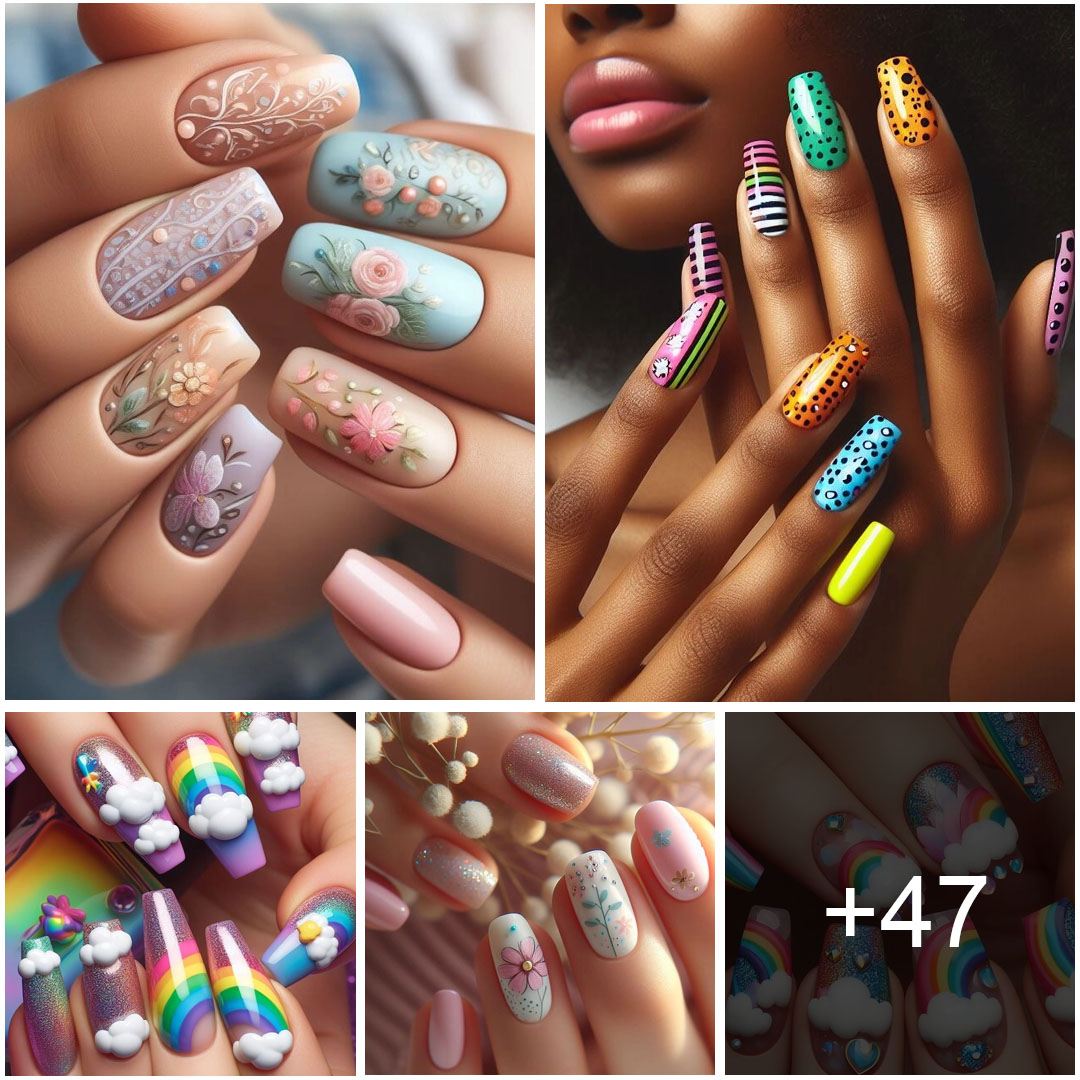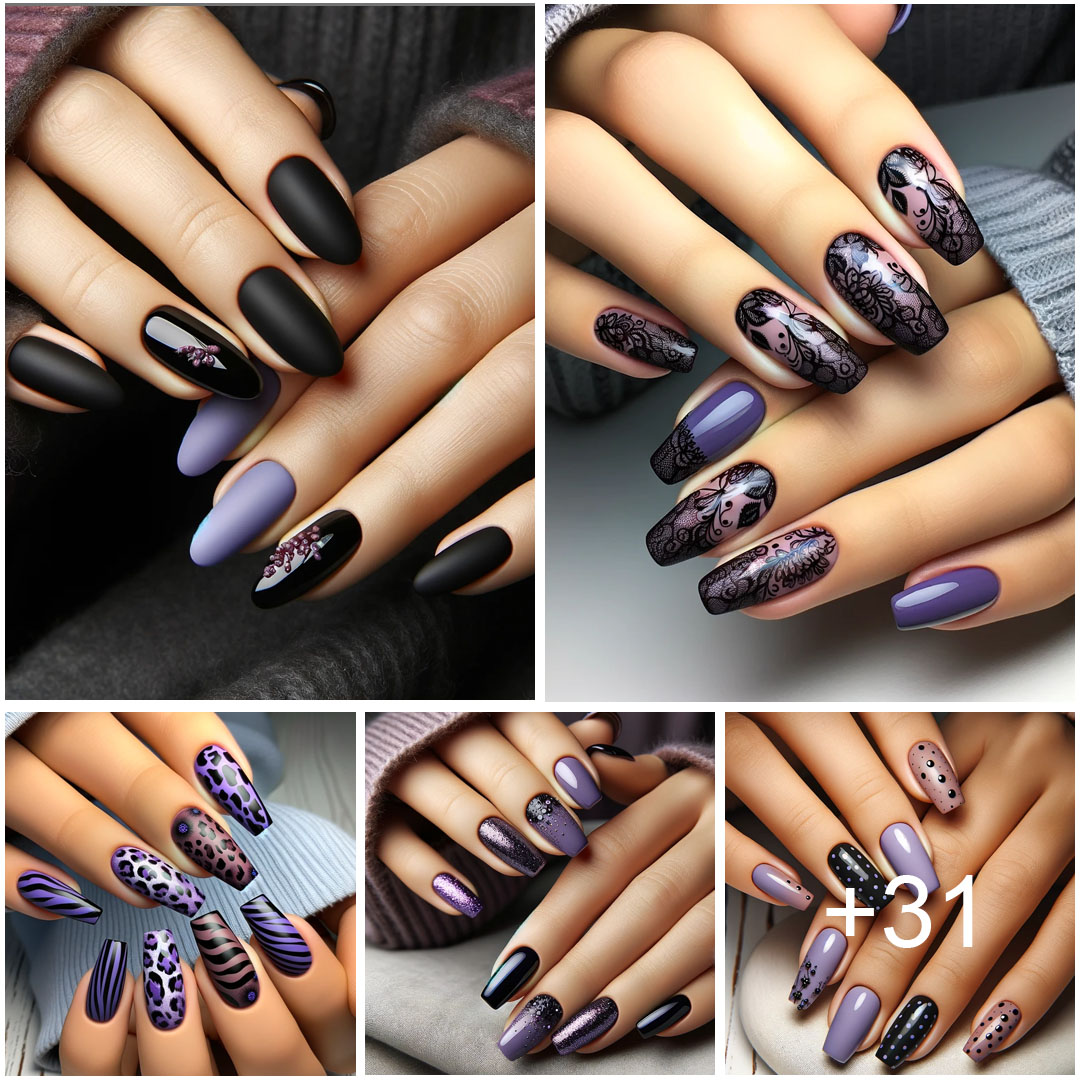En el vibrante mundo de la belleza y la autoexpresión, pocas formas de adorno poseen el mismo encanto atemporal que el arte de las uñas. Desde las civilizaciones antiguas hasta las tendencias modernas, la práctica de embellecer las uñas ha trascendido el tiempo, la cultura y la geografía, dejando una huella imborrable en la historia de la humanidad. En esta exploración exhaustiva, nos embarcamos en un viaje a través de la evolución del arte de las uñas, rastreando sus orígenes, hitos y manifestaciones contemporáneas.
El arte de uñas, como término, abarca una amplia gama de técnicas y estilos destinados a realzar la belleza de las uñas. Abarca desde la simple aplicación de esmalte hasta diseños intrincados con gemas, pegatinas y motivos pintados a mano. En esencia, es una forma de autoexpresión que permite a las personas mostrar su creatividad, personalidad y estilo a través de lienzos en miniatura al alcance de la mano.
Sus raíces se encuentran en lo más profundo de la historia, remontándose a civilizaciones antiguas que valoraban la belleza y la ornamentación. Las culturas mesopotámicas, por ejemplo, adornaban sus uñas con intrincados diseños con pigmentos naturales, lo que marcó el inicio de una tradición que perduraría durante milenios. En el antiguo Egipto, adquirió un significado simbólico, con diferentes colores y motivos que representaban estatus social, creencias religiosas e incluso protección contra fuerzas malévolas.
A medida que las sociedades evolucionaron, también lo hizo la práctica del arte de las uñas. En la Europa medieval y renacentista, la decoración de uñas se convirtió en sinónimo de lujo y estatus, especialmente entre la nobleza. Las iluminaciones manuscritas de este período representan a mujeres nobles con uñas elaboradamente adornadas, mostrando la intrincada artesanía y la atención al detalle que definían los estándares de belleza de la época. La Italia renacentista, en particular, presenció un resurgimiento del interés por el arte de las uñas, con mecenas adinerados que encargaban a los artistas la creación de obras maestras en miniatura con las yemas de sus dedos.
Los albores del siglo XX trajeron consigo importantes avances tecnológicos y de producción en masa, democratizando el arte de las uñas y haciéndolo accesible a un público más amplio. El glamour de Hollywood jugó un papel fundamental en su popularización, con las actrices principales de la gran pantalla luciendo colores y diseños atrevidos que cautivaron al público mundial. En la posguerra, la popularidad del arte de las uñas continuó en aumento, con innovaciones como las uñas acrílicas y las técnicas de aerografía que traspasaron los límites de la creatividad.
En la era digital, el nail art ha experimentado un resurgimiento propio, gracias en gran parte al auge de las redes sociales y las comunidades en línea . Plataformas como Instagram, Pinterest y TikTok se han convertido en galerías virtuales donde los artistas de uñas muestran sus últimas creaciones, inspirando a millones de seguidores con su creatividad y habilidad. Desde diseños minimalistas hasta creaciones vanguardistas, las posibilidades son infinitas en el panorama digital, donde las tendencias se extienden como la vida silvestre y los incendios forestales, y los límites se desafían constantemente.
Al embarcarnos en este viaje a través de la evolución del arte de las uñas, recordamos su perdurable atractivo y significado a través de culturas y generaciones. Desde sus humildes inicios en las civilizaciones antiguas hasta su renacimiento actual en la era digital, el arte de las uñas sigue cautivando e inspirando, siendo un testimonio del poder de la belleza, la creatividad y la autoexpresión. Acompáñenos a profundizar en este fascinante mundo, descubriendo los secretos, las historias y las innovaciones que han convertido el arte de las uñas en la forma de arte tan apreciada que es hoy.
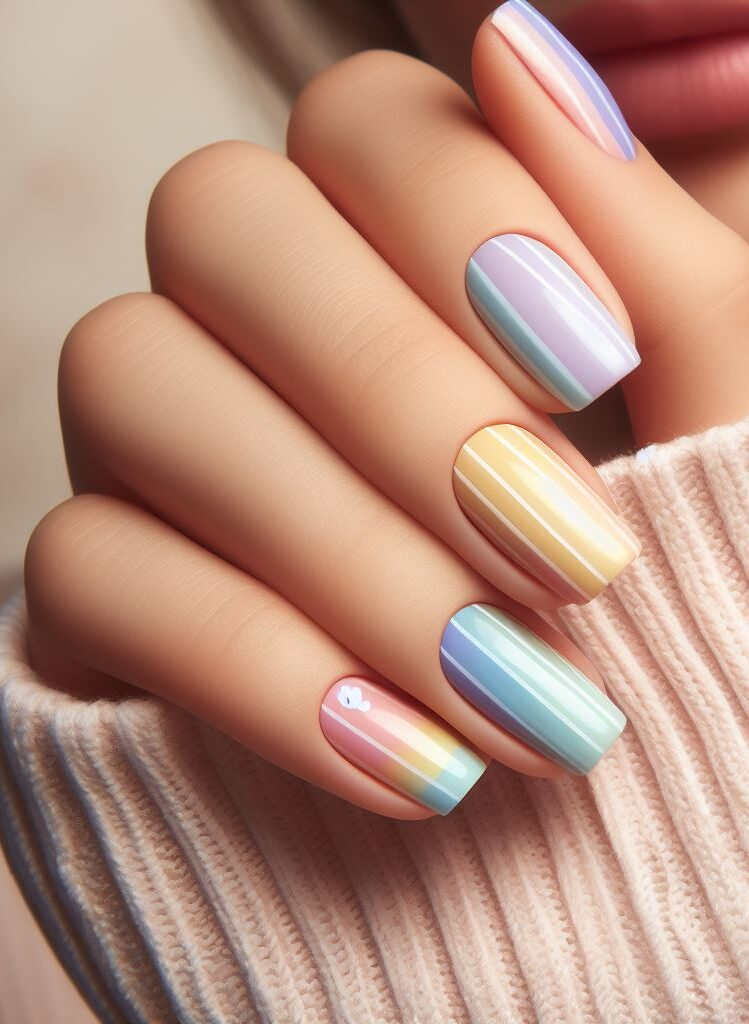
Uñas inspiradas en colores increíbles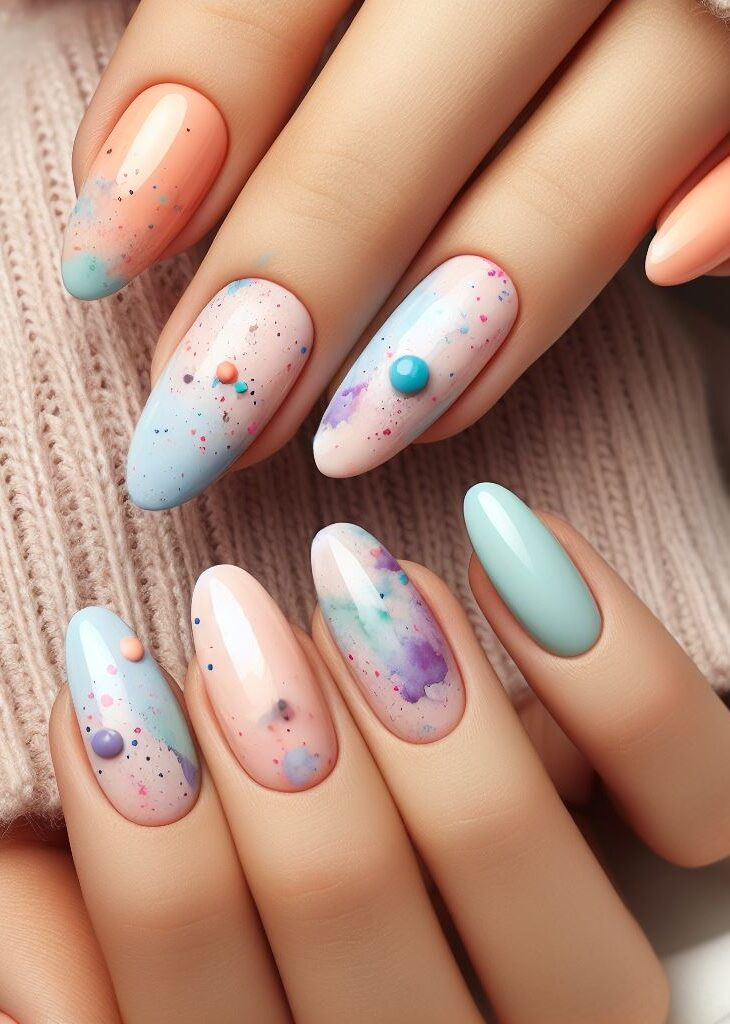 Uñas inspiradas en colores increíbles
Uñas inspiradas en colores increíbles
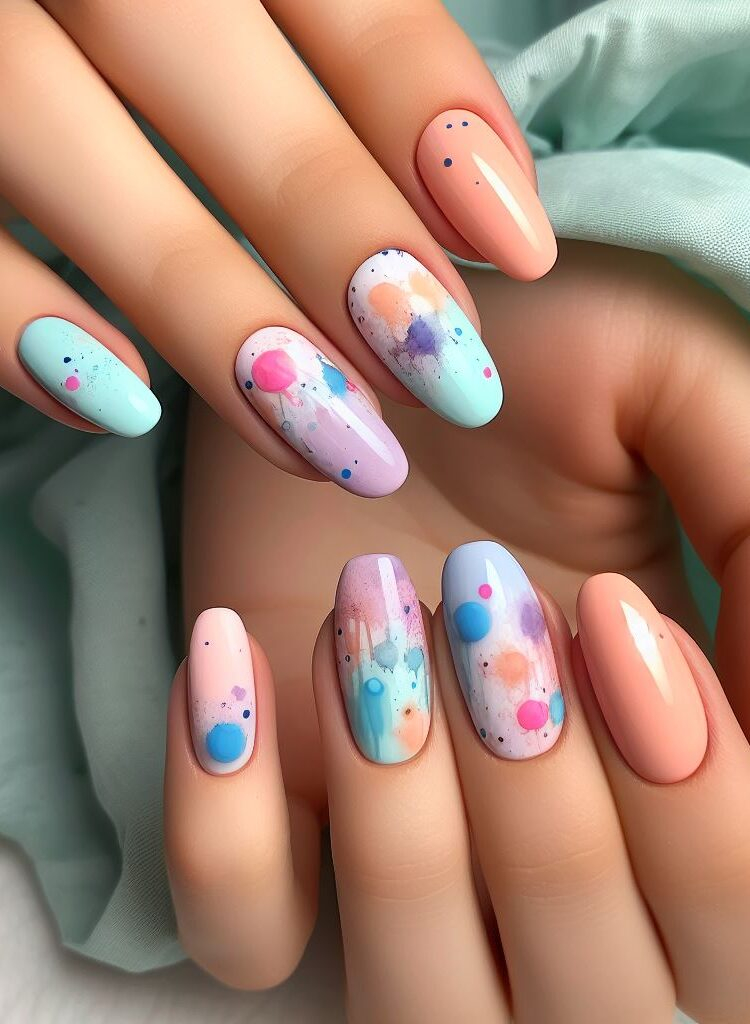
Uñas inspiradas en colores increíbles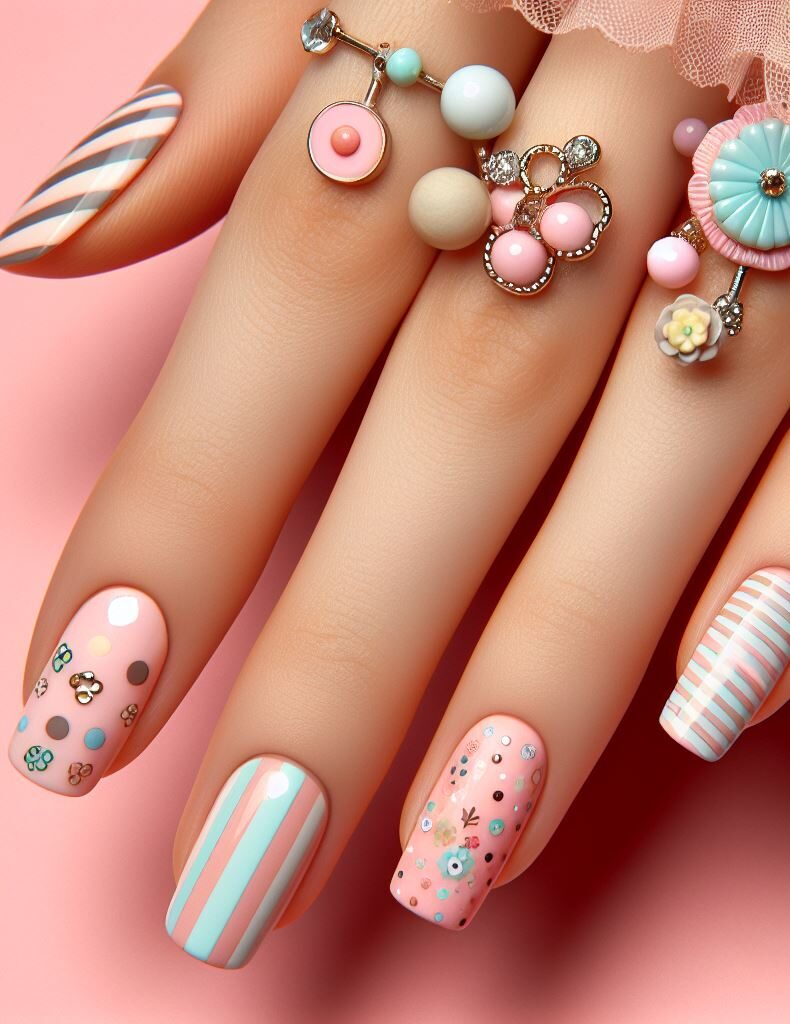 Uñas inspiradas en colores increíbles
Uñas inspiradas en colores increíbles
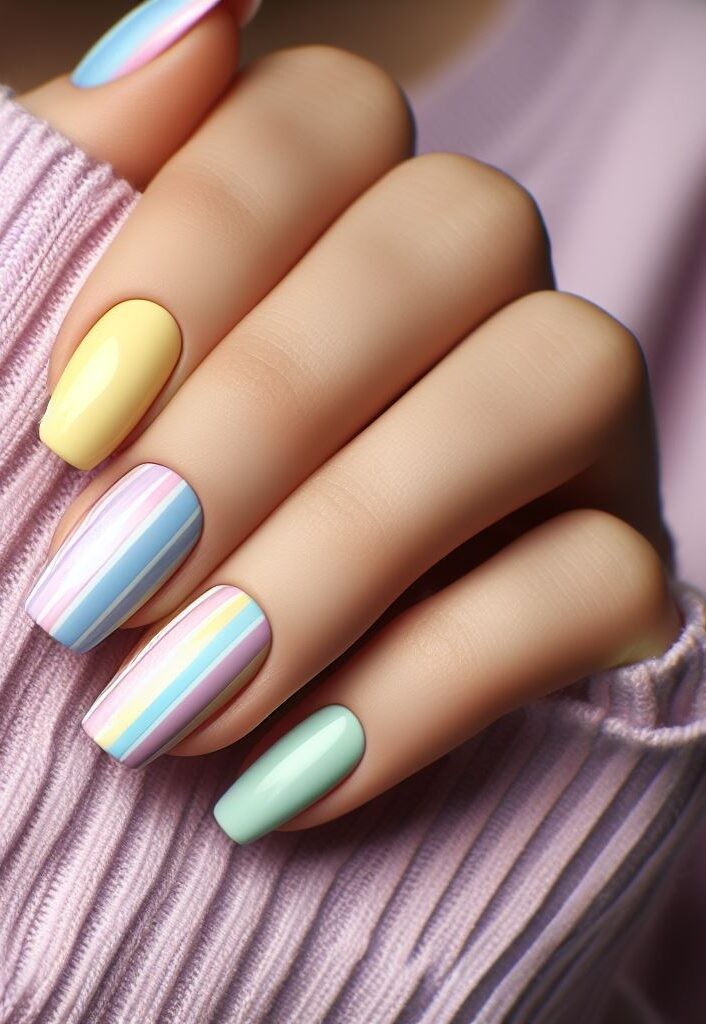
Uñas inspiradas en colores increíbles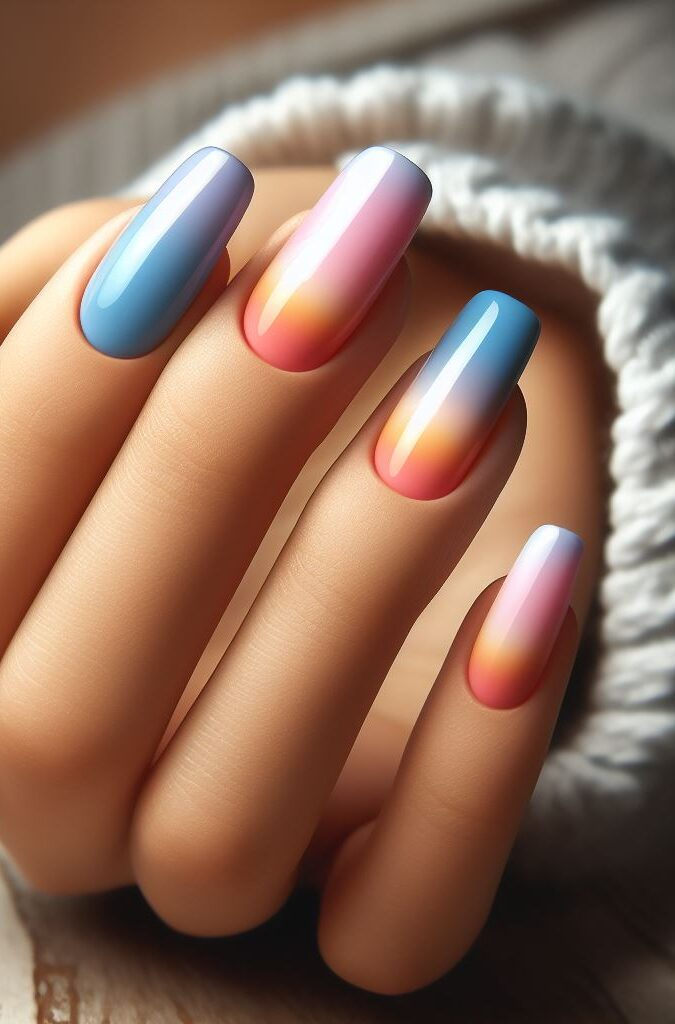 Uñas inspiradas en colores increíbles
Uñas inspiradas en colores increíbles
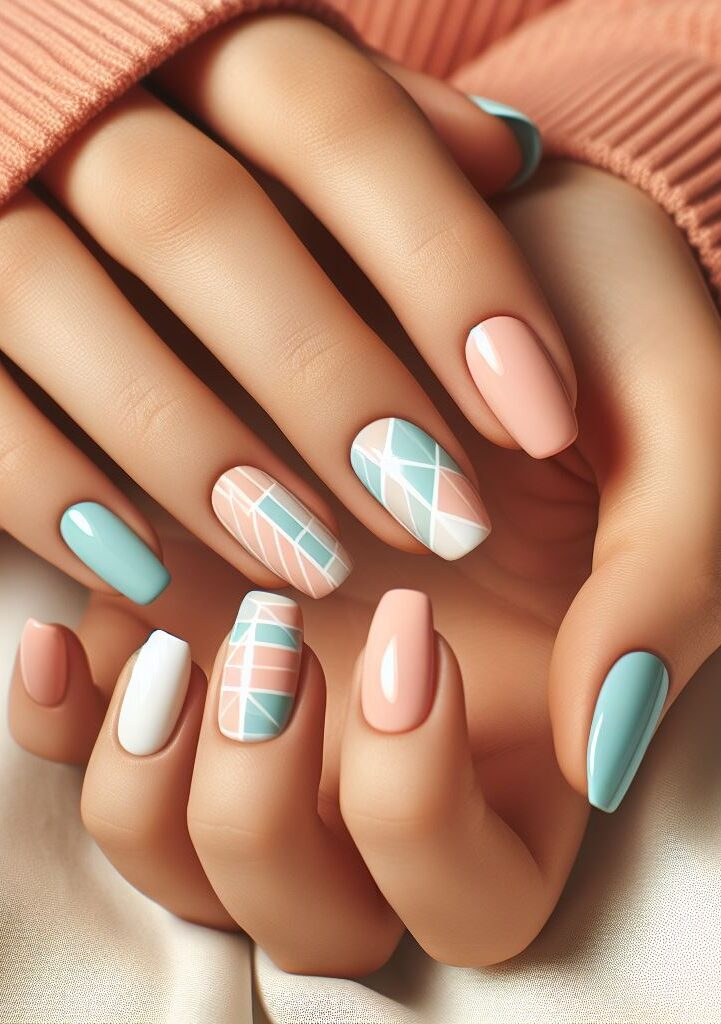
Uñas inspiradas en colores increíbles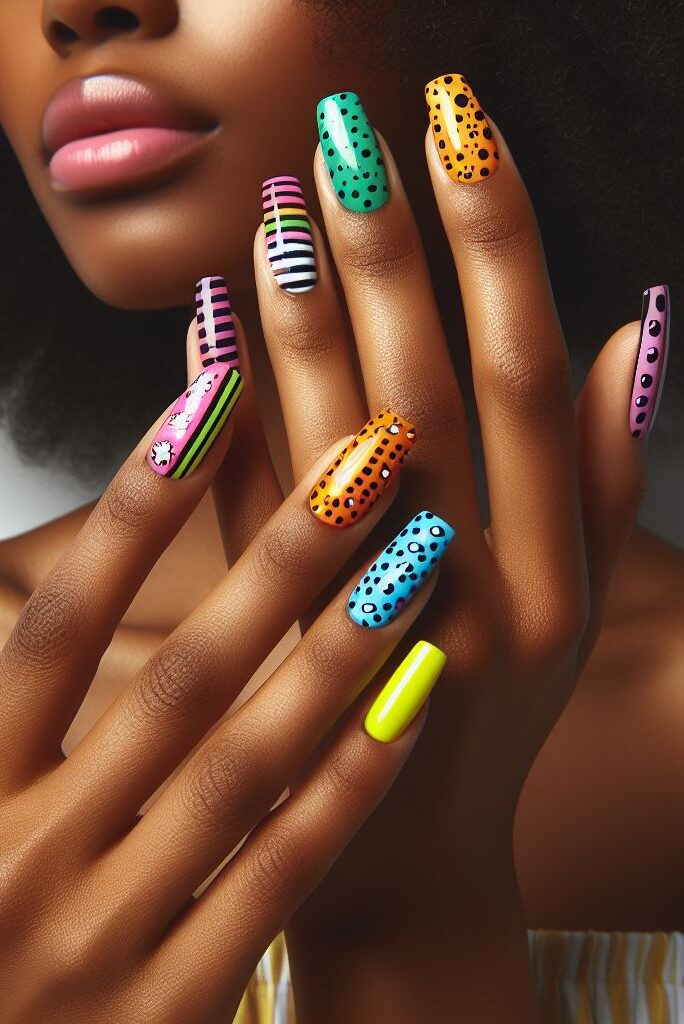 Uñas inspiradas en colores increíbles
Uñas inspiradas en colores increíbles
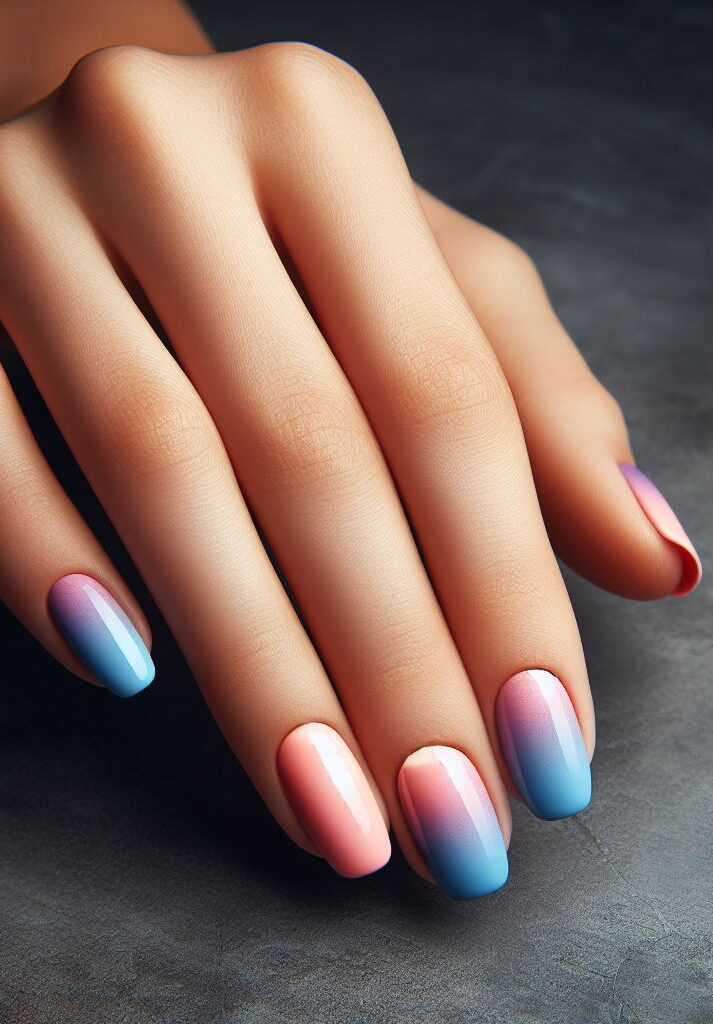
Uñas inspiradas en colores increíblesEl arte de las uñas, una práctica apreciada en la actualidad por su capacidad de transformar las uñas en deslumbrantes obras de arte, tiene sus raíces profundamente arraigadas en las antiguas civilizaciones de Mesopotamia, Egipto y más allá. En esta exploración del arte de las uñas en civilizaciones antiguas, descubrimos los orígenes, el significado y las técnicas que empleaban nuestros antepasados para adornar sus uñas con intrincados diseños y motivos simbólicos.
Mesopotamia, cuna de la civilización, se encuentra entre los primeros lugares conocidos donde se practicaba el arte de las uñas. En esta antigua tierra, las personas adornaban sus uñas con pigmentos naturales provenientes de minerales y plantas, creando elaborados diseños que reflejaban su estatus, cultura y creencias. Desde sencillos patrones geométricos hasta intrincados motivos inspirados en la naturaleza, el arte de las uñas mesopotámico sentó las bases de una tradición que perduraría durante milenios.
En el antiguo Egipto, el arte de las uñas adquirió un profundo significado simbólico, con diferentes colores y diseños que guardaban significados y asociaciones específicas. Por ejemplo, los miembros de la corte real solían adornarse las uñas con vibrantes tonos rojos y dorados, que simbolizaban riqueza, poder y protección divina. Además, los intrincados patrones y motivos hallados en los artefactos del antiguo Egipto revelan la meticulosa artesanía y el talento artístico que caracterizaban el arte de las uñas en esta antigua civilización.
Más allá del antiguo Oriente Próximo, el arte de las uñas floreció en civilizaciones de toda Asia, incluyendo China e India. En China, el arte de las uñas no solo era una forma de adorno, sino también un reflejo del estatus social y la identidad cultural. Elaborados diseños con símbolos y motivos auspiciosos se pintaban meticulosamente sobre las uñas con delicados pinceles, mostrando la habilidad y precisión de los antiguos artesanos chinos. De igual manera, en la India, el arte de las uñas estaba imbuido de un significado espiritual, con intrincados diseños de henna que adornaban las uñas durante ceremonias y festivales religiosos.
El legado del nail art en las civilizaciones antiguas va mucho más allá de la mera estética, influyendo en las tradiciones artísticas y las prácticas culturales de los siglos venideros. Desde los intrincados diseños de Mesopotamia hasta los motivos simbólicos del antiguo Egipto y el significado espiritual del nail art en Asia, las prácticas y técnicas desarrolladas por nuestros antepasados siguen inspirando e influyendo en el movimiento moderno de las uñas.
Al reflexionar sobre la rica diversidad del arte de las uñas en las civilizaciones antiguas, recordamos la belleza atemporal y la importancia cultural de esta práctica milenaria. Desde sus humildes orígenes en Mesopotamia hasta su expansión e influencia global, el arte de las uñas sigue cautivando e inspirando, siendo un testimonio de la creatividad, el ingenio y la expresión artística de la humanidad a lo largo de la historia. Únase a nosotros para celebrar el arte de nuestros antepasados y rendir homenaje al legado perdurable del arte de las uñas en todas sus formas.
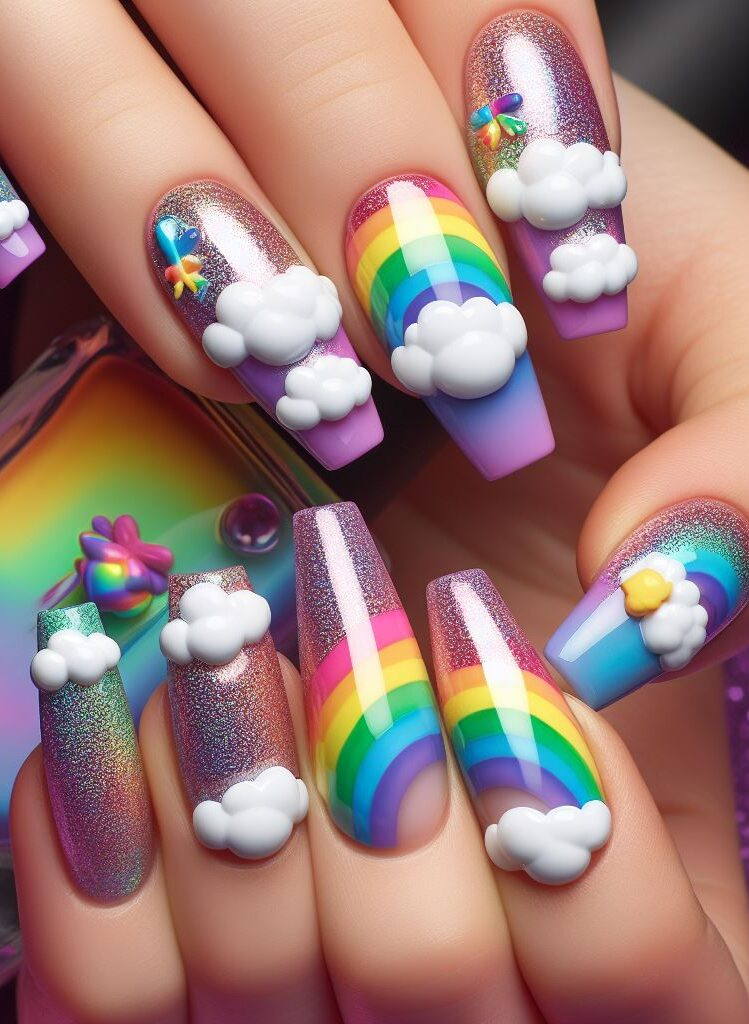 ¡Cabeza en las nubes, pero estilo perfecto! ☁️ El arte de uñas de arcoíris y nubes es un diseño caprichoso y divertido, perfecto para soñadoras y espíritus libres.
¡Cabeza en las nubes, pero estilo perfecto! ☁️ El arte de uñas de arcoíris y nubes es un diseño caprichoso y divertido, perfecto para soñadoras y espíritus libres.
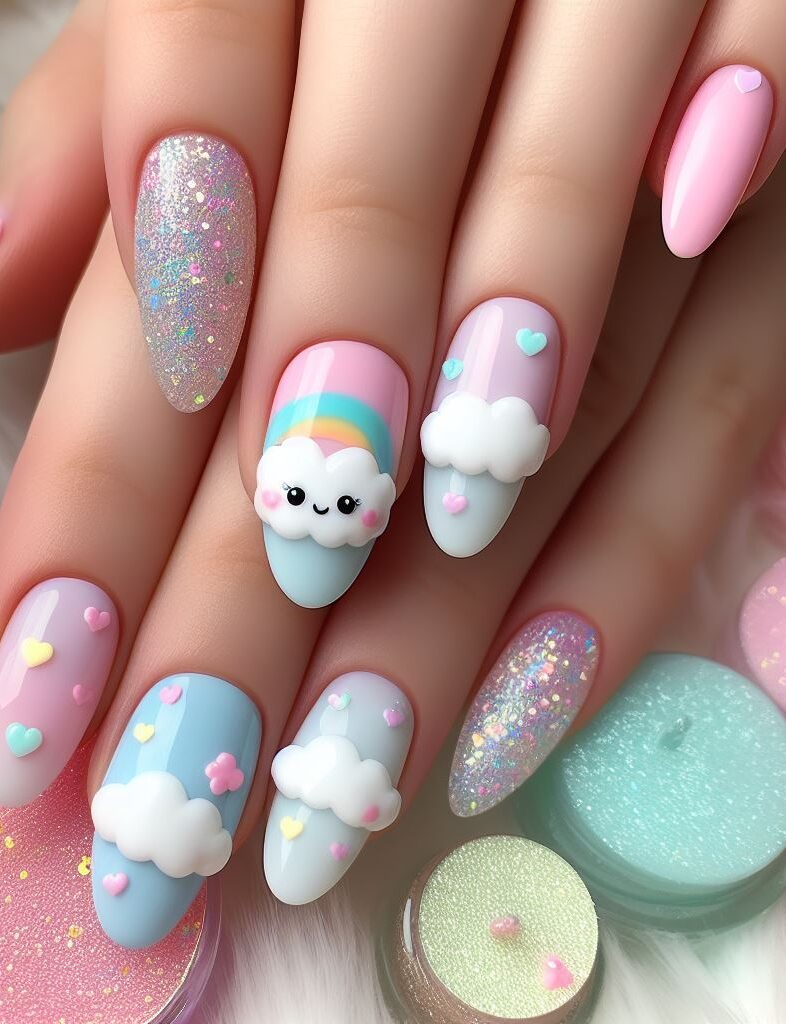
¡Deja que tus uñas reflejen la belleza de la naturaleza! Combina nubes esponjosas y arcoíris vibrantes para un diseño de uñas relajante y alegre.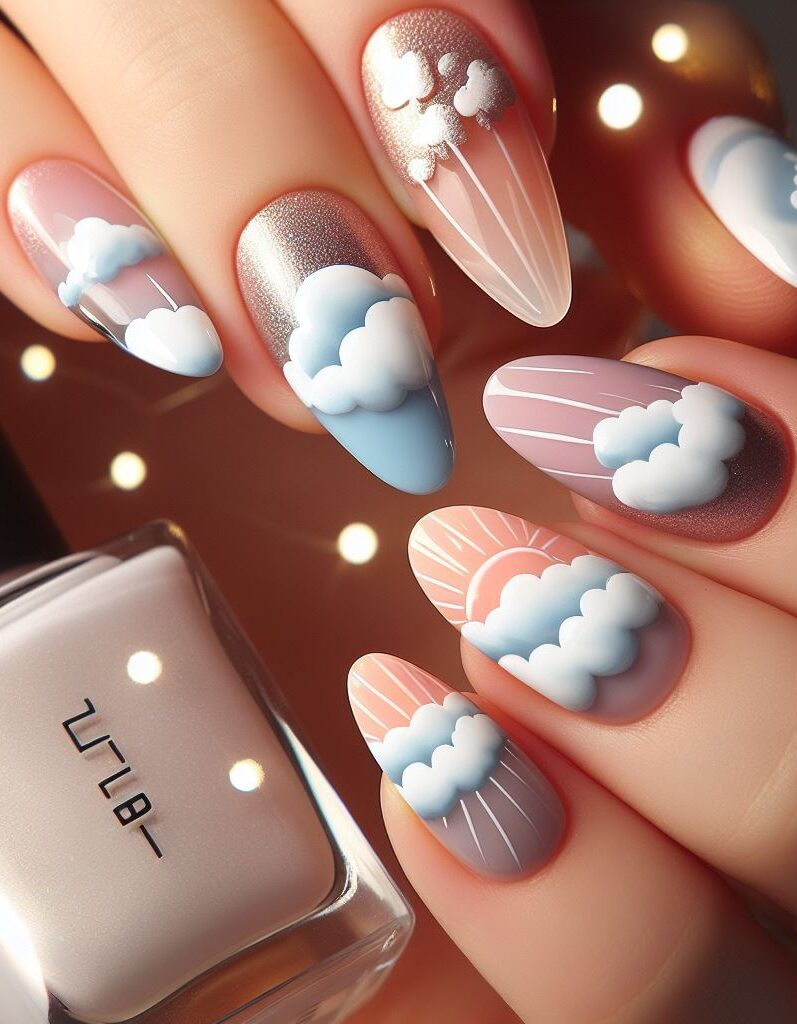 ¡Magia minimalista! Recrea la esencia de un cielo despejado con una nube blanca y esponjosa y un delicado arcoíris para un toque moderno.
¡Magia minimalista! Recrea la esencia de un cielo despejado con una nube blanca y esponjosa y un delicado arcoíris para un toque moderno.
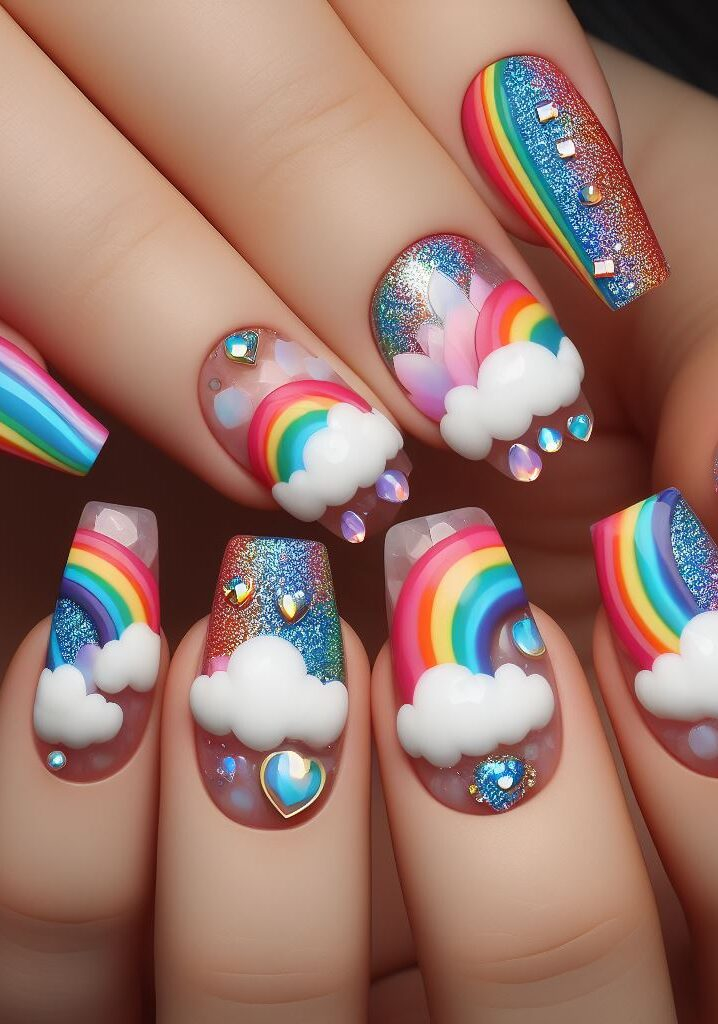
¡No tengas miedo de ser atrevida! Combina nubes de tormenta dramáticas con un arcoíris vibrante para lograr un diseño de uñas impactante.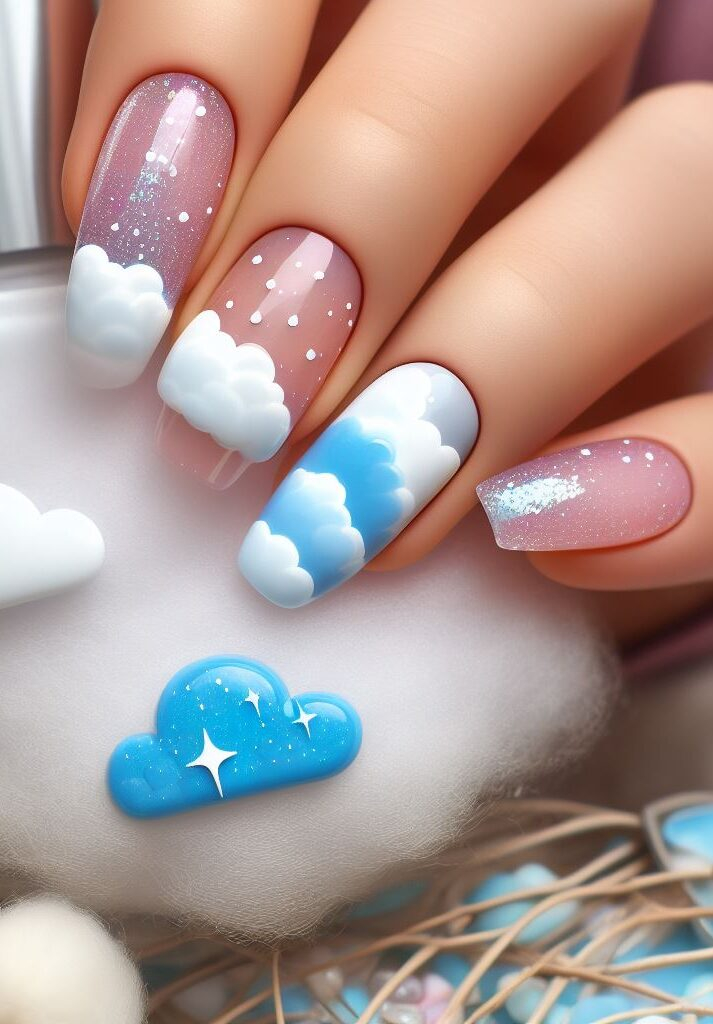 ¡Glamour degradado! Crea un efecto fascinante con un color base que va del azul al blanco y añade un toque mágico con purpurina.
¡Glamour degradado! Crea un efecto fascinante con un color base que va del azul al blanco y añade un toque mágico con purpurina.
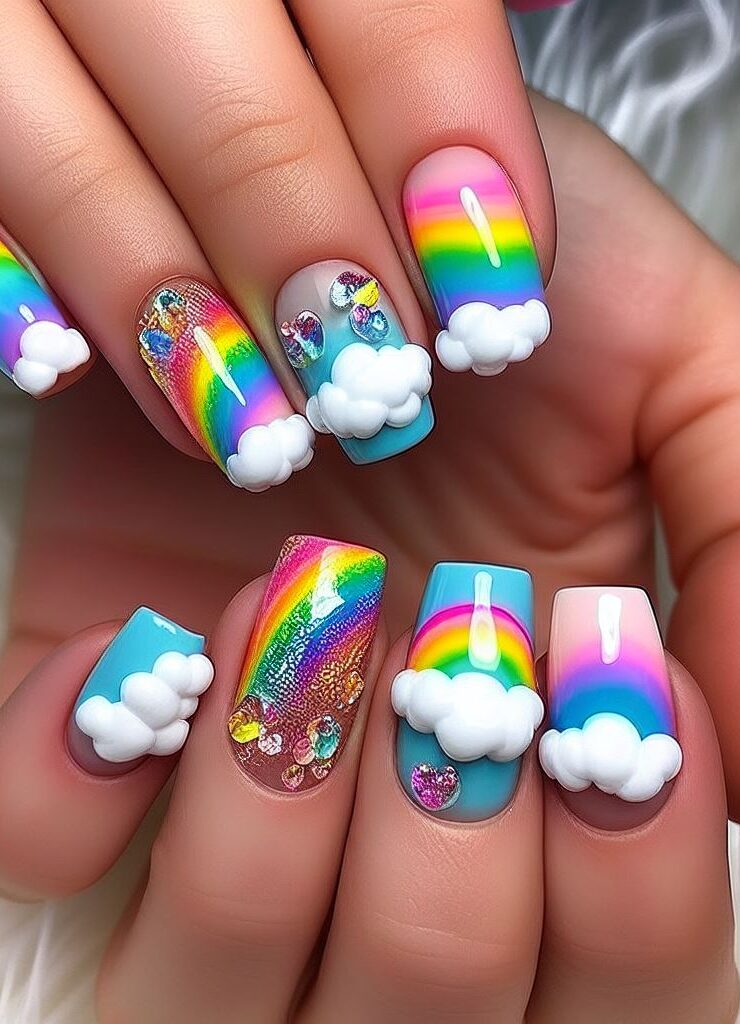
¡Puntas de ensueño! ☁️✨ Combina nubes esponjosas y arcoíris vibrantes para un diseño de uñas caprichoso y colorido. ¡Perfecto para la soñadora que llevas dentro!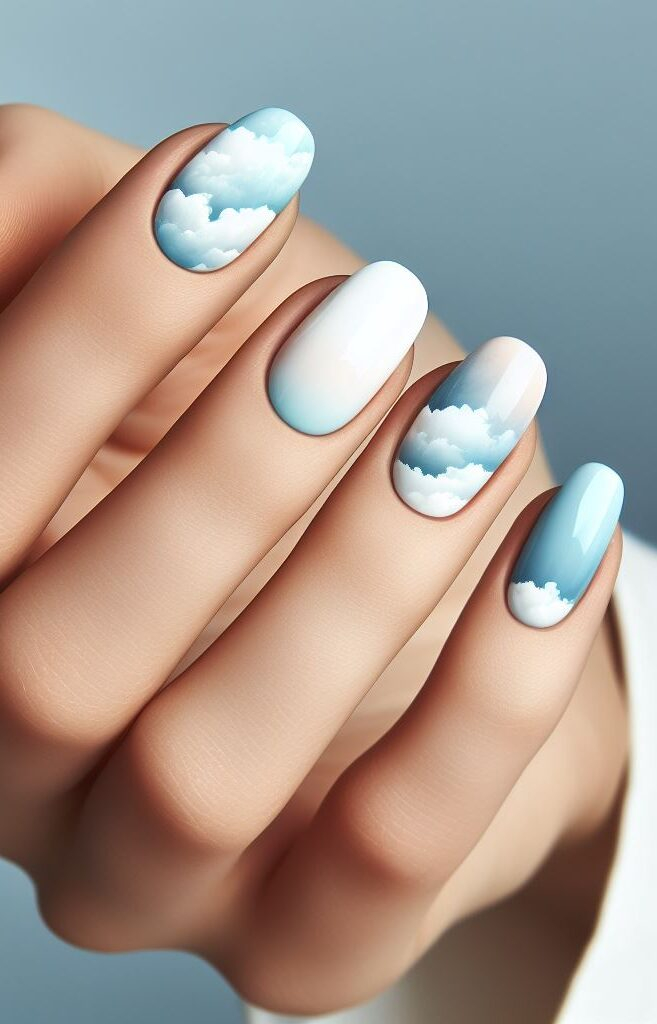 ¡Te esperan unas uñas de ensueño! ☁️ Inspira la belleza del cielo con un diseño de uñas de nubes en relajantes tonos azules y blancos. Experimenta con texturas suaves y formas divertidas para un look caprichoso.
¡Te esperan unas uñas de ensueño! ☁️ Inspira la belleza del cielo con un diseño de uñas de nubes en relajantes tonos azules y blancos. Experimenta con texturas suaves y formas divertidas para un look caprichoso.
Página 2
Durante la Edad Media y el Renacimiento en Europa, surgió como símbolo de riqueza, estatus y gusto refinado entre la aristocracia. Esta época presenció un florecimiento de la expresión artística, con los nobles adornando sus uñas con intrincados diseños y lujosos adornos para simbolizar su elevada posición social. Profundicemos en este fascinante capítulo de la historia del arte de las uñas, explorando las técnicas, tendencias e influencias culturales que definieron los estándares de belleza en la Europa medieval y renacentista.
En la Europa medieval y renacentista, era más que un simple accesorio de moda; era un símbolo de privilegio y sofisticación aristocrática. Los nobles adornaban sus uñas con elaborados diseños y materiales preciosos, como pan de oro, perlas y piedras preciosas, para mostrar su riqueza y estatus. Estas elaboradas decoraciones para uñas eran un testimonio visual del refinamiento y el gusto exquisito de quien las llevaba, despertando admiración y envidia entre sus pares.
Una de las visiones más fascinantes del arte de uñas de este período se encuentra en los manuscritos iluminados. Estos exquisitos libros artesanales, a menudo encargados por mecenas adinerados, presentaban ilustraciones que representaban escenas de la vida cotidiana, incluyendo representaciones de mujeres nobles con uñas meticulosamente adornadas. Las iluminaciones de manuscritos ofrecen valiosas perspectivas sobre las técnicas, estilos y preferencias estéticas del arte de uñas de la Europa medieval y renacentista, ofreciendo una ventana al opulento mundo de los rituales de belleza aristocráticos.
El Renacimiento, en particular, presenció un resurgimiento del interés por el arte de las uñas entre la élite europea. Influenciada por los logros artísticos y culturales de las civilizaciones antiguas, la nobleza renacentista buscó emular los ideales de belleza de la Antigüedad clásica, incluyendo la práctica de la decoración de uñas. Los mecenas adinerados encargaban a artesanos expertos la creación de intrincados diseños de uñas inspirados en motivos mitológicos, patrones florales y elementos arquitectónicos, elevando el arte de las uñas a nuevas cotas de expresión artística y sofisticación.
El arte de uñas en la Europa medieval y renacentista no era monolítico, sino que variaba según las costumbres regionales, las influencias culturales y las preferencias individuales. Las distintas regiones europeas desarrollaron sus propios estilos y técnicas de decoración de uñas, reflejando la diversidad de tradiciones artísticas y sensibilidades estéticas del continente. Desde los ornamentados diseños de uñas predilectos de la nobleza renacentista italiana hasta los motivos más sencillos pero elegantes, preferidos en el norte de Europa, el arte de uñas era un reflejo de la identidad regional y el patrimonio cultural.
El legado del nail art en la Europa medieval y renacentista perdura hasta nuestros días, como testimonio de la fascinación imperecedera por la belleza y la ornamentación. Si bien las técnicas y los materiales han evolucionado con el tiempo, los ideales aristocráticos de elegancia, refinamiento y lujo siguen inspirando a artistas y entusiastas de las uñas contemporáneas de todo el mundo. Al explorar la rica historia del nail art en la Europa medieval y renacentista, profundizamos en esta forma de arte atemporal y su encanto imperecedero.
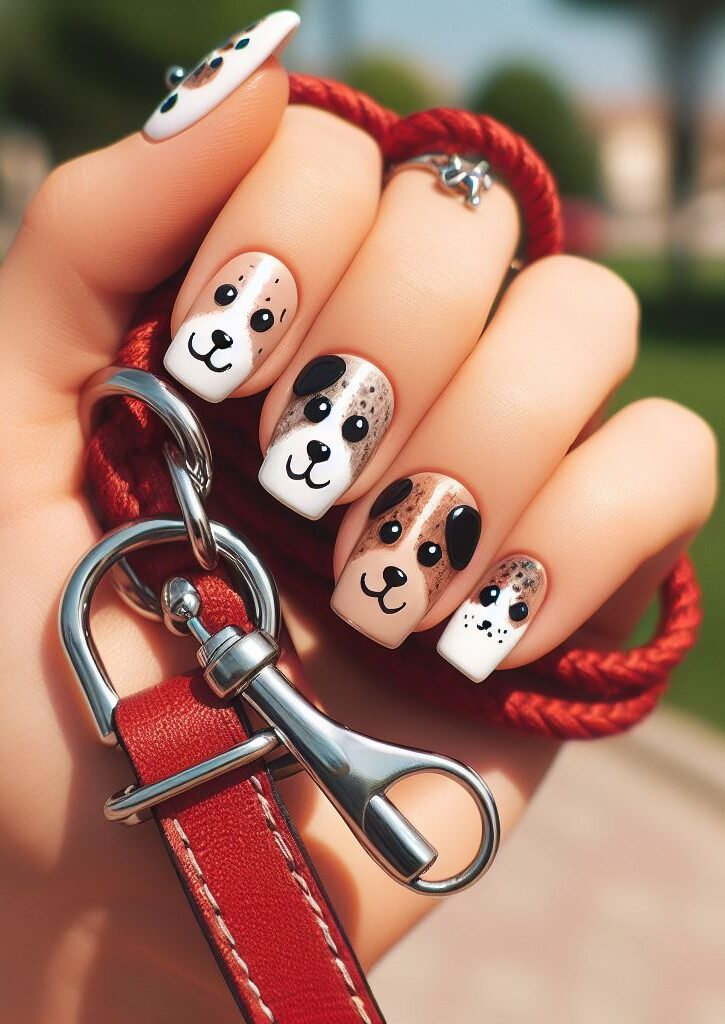
¡Dios mío! ¡Amor cachorrito al alcance de tu mano! Estos adorables diseños de uñas presentan caritas de cachorros de todas las formas y tamaños, perfectos para cualquier fanática de los perros.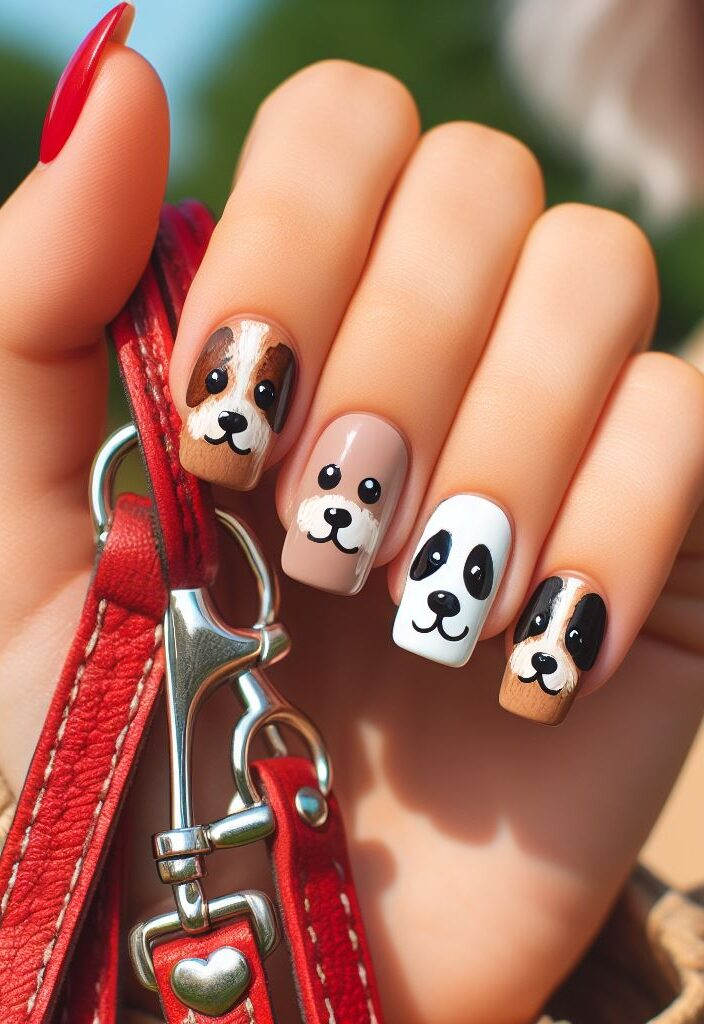 Uñas con cara de cachorro lindas
Uñas con cara de cachorro lindas
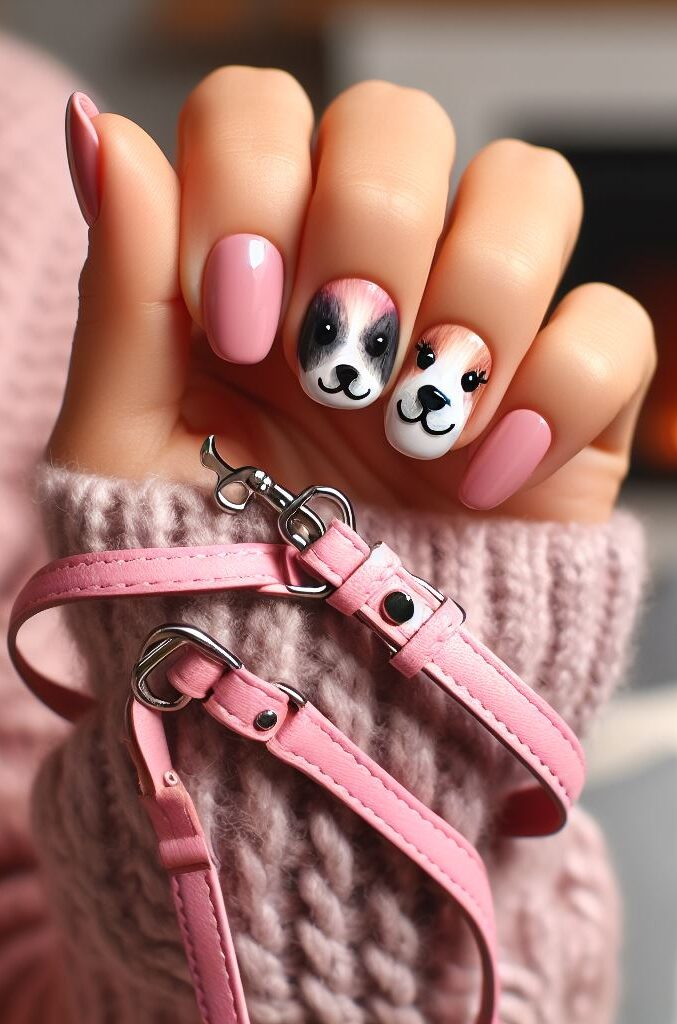
¡Prepárate para derretir corazones con estas irresistibles decoraciones de uñas con caras de cachorro! Con orejas caídas, lenguas juguetonas y ojos brillantes, estos diseños son increíblemente adorables.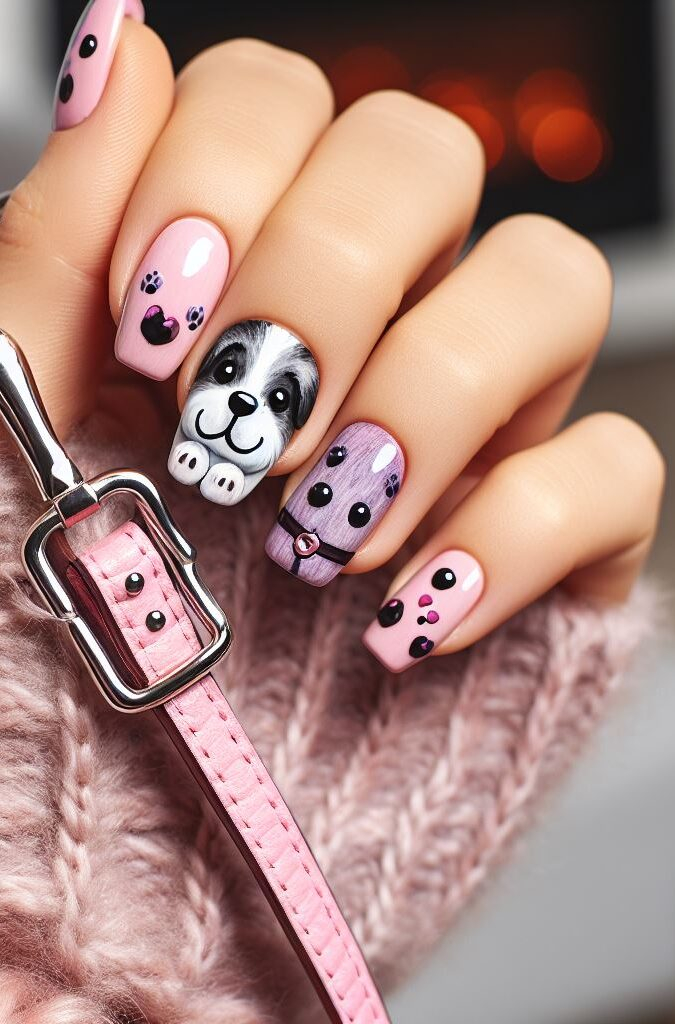 ¡Da rienda suelta a tu creatividad con estas originales variaciones de uñas con caras de cachorro! Prueba con un efecto acuarela original o un estilo pop art audaz: ¡las posibilidades son infinitas!
¡Da rienda suelta a tu creatividad con estas originales variaciones de uñas con caras de cachorro! Prueba con un efecto acuarela original o un estilo pop art audaz: ¡las posibilidades son infinitas!
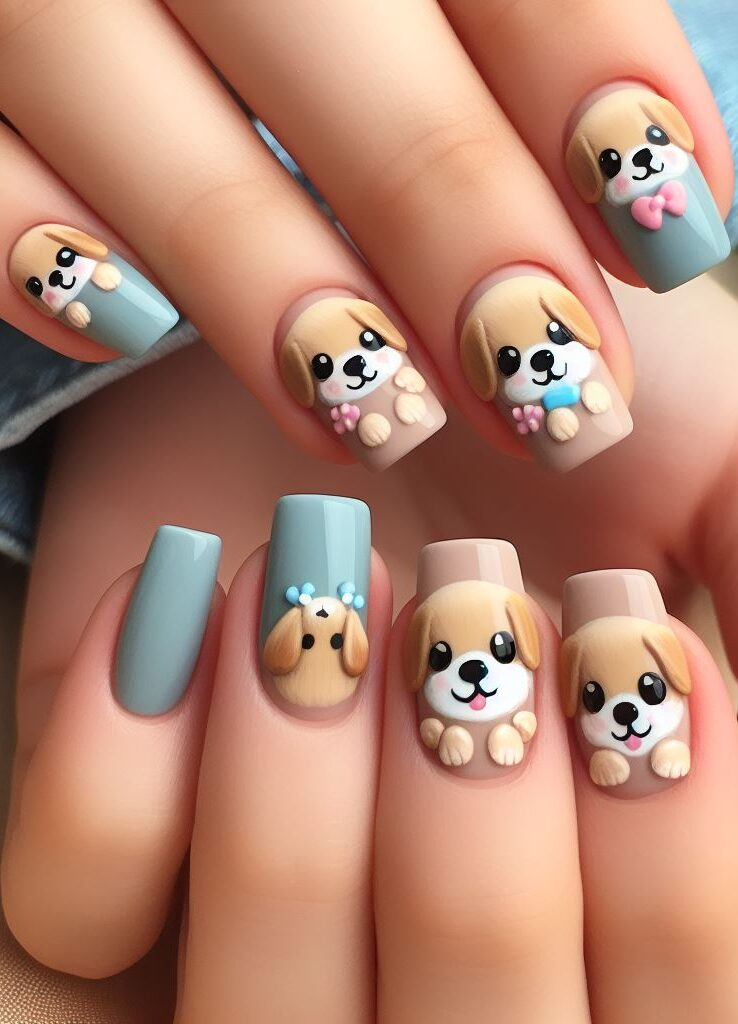 ¡Demuestra tu amor por todo lo canino con estos fantásticos diseños de uñas! Estas adorables caritas de cachorro vienen con pequeñas huellas, corazones e incluso pañuelos para darles un toque divertido.
¡Demuestra tu amor por todo lo canino con estos fantásticos diseños de uñas! Estas adorables caritas de cachorro vienen con pequeñas huellas, corazones e incluso pañuelos para darles un toque divertido.
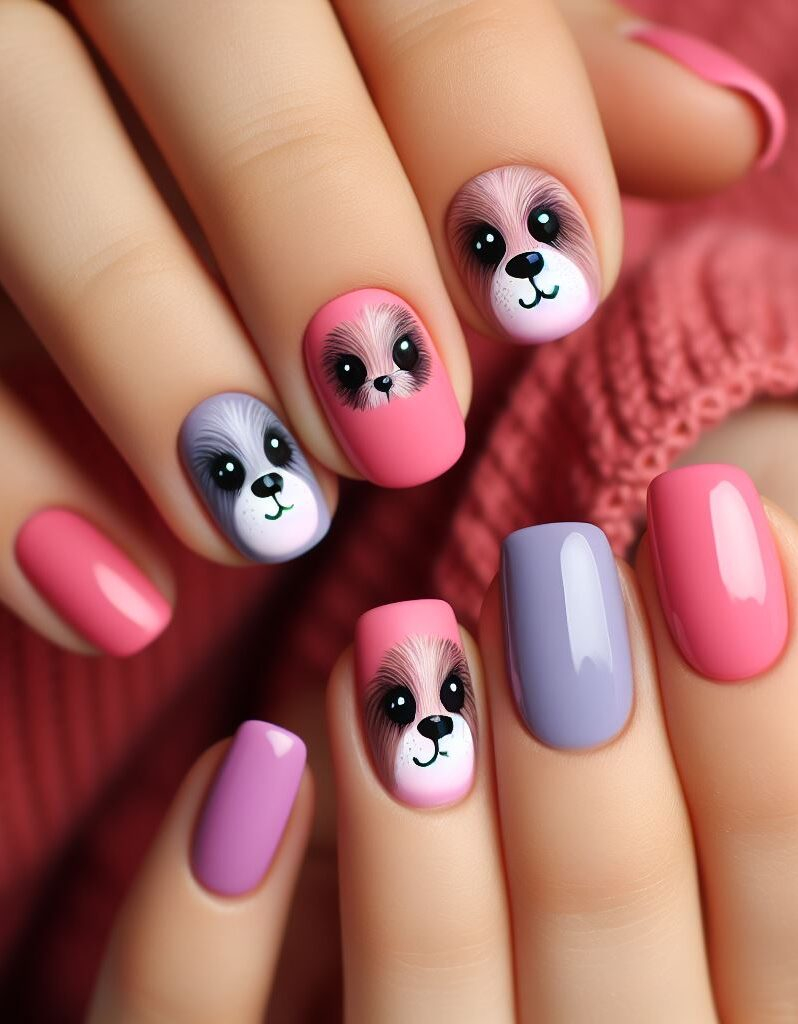 ¿Te sientes un poco rara? ¡Anímate con estas alegres y brillantes decoraciones de uñas con caras de cachorro! Con un arcoíris de colores y patrones divertidos, estos diseños te harán sonreír.
¿Te sientes un poco rara? ¡Anímate con estas alegres y brillantes decoraciones de uñas con caras de cachorro! Con un arcoíris de colores y patrones divertidos, estos diseños te harán sonreír.
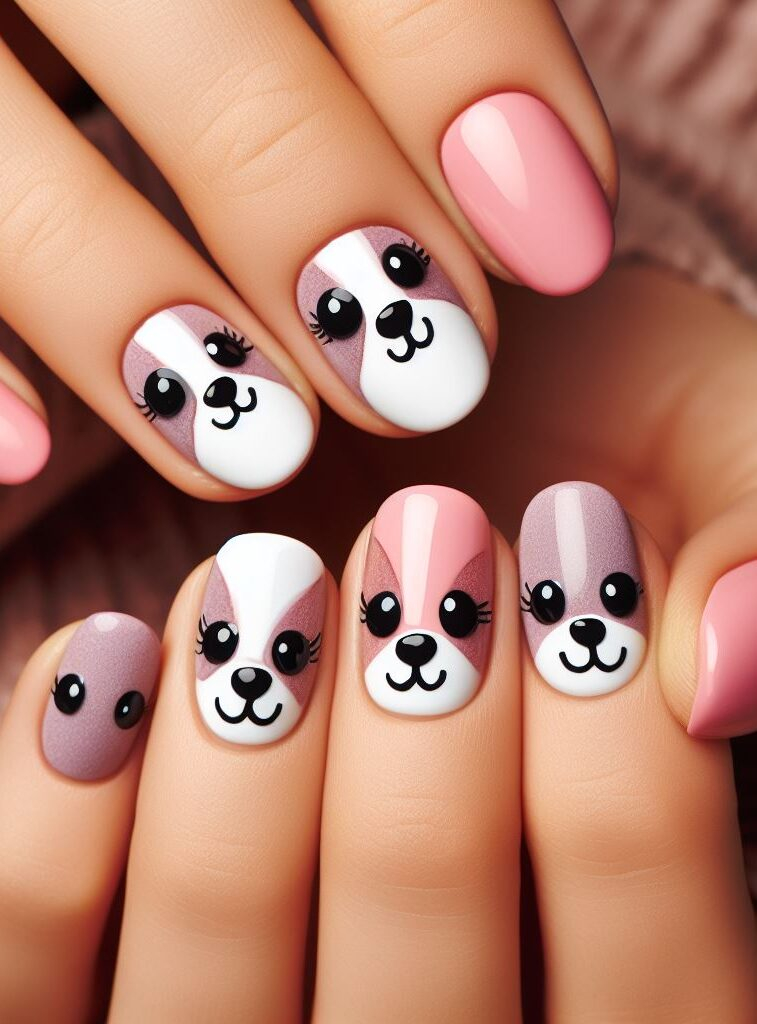 ¿Quién necesita un cachorro de verdad cuando puedes tenerlo en tus uñas? Estas decoraciones realistas con caras de cachorro capturan todos los detalles que te encantan, desde el suave pelaje hasta los ojos conmovedores.
¿Quién necesita un cachorro de verdad cuando puedes tenerlo en tus uñas? Estas decoraciones realistas con caras de cachorro capturan todos los detalles que te encantan, desde el suave pelaje hasta los ojos conmovedores.
Con la llegada de la era moderna, el arte de las uñas experimenta una transformación, pasando de ser un símbolo de privilegio aristocrático a una forma popular de autoexpresión y creatividad. Los siglos XX y XXI presencian una democratización del arte de las uñas, impulsada por los avances tecnológicos, los movimientos sociales y los cambios culturales. En esta exploración, profundizamos en el dinámico panorama del arte de las uñas moderno, rastreando su evolución e impacto en los estándares de belleza contemporáneos.
La Revolución Industrial del siglo XIX marcó el comienzo de una nueva era para el arte de las uñas, ya que los avances en la fabricación y la producción en masa hicieron que los productos de belleza fueran más accesibles para las masas. Con la proliferación de esmaltes y otros productos para el cuidado de las uñas, personas de todos los ámbitos pueden experimentar con diferentes colores, texturas y diseños, marcando el comienzo de una era de democratización e innovación en el arte de las uñas.
A principios del siglo XX, el glamour de Hollywood se afianzó, con estrellas de cine que se convirtieron en pioneras en moda y belleza. Grandes figuras de la gran pantalla, como Marilyn Monroe y Audrey Hepburn, cautivaron al público con sus atrevidos diseños de uñas, inspirando a legiones de fans a imitar sus icónicos looks. El nail art se convirtió en sinónimo de sofisticación y glamour, ya que las mujeres buscaban replicar las manos impecables de sus ídolos favoritos.
El boom de la posguerra: la edad de oro del arte de las uñas
La posguerra presenció un auge del arte de uñas, impulsado por la prosperidad económica y los cambios culturales. Con el auge de la cultura de consumo y la llegada de la publicidad televisiva, el arte de uñas se volvió cada vez más accesible y omnipresente, a medida que las marcas de belleza competían por cuota de mercado en la floreciente industria cosmética. Los salones de uñas proliferaron en los centros urbanos, ofreciendo una amplia gama de servicios, desde manicuras sencillas hasta elaborados diseños de arte de uñas, atendiendo los diversos gustos y preferencias de los consumidores.
La segunda mitad del siglo XX presenció una proliferación de avances tecnológicos que revolucionaron el arte de las uñas. Innovaciones como las uñas acrílicas, el esmalte de gel y las técnicas de aerografía permiten a los artistas de uñas superar los límites de la creatividad, creando diseños intrincados y efectos tridimensionales antes inimaginables. Estos avances tecnológicos democratizan aún más el arte de las uñas, permitiendo a las personas expresar su creatividad e individualidad a través de ellas.
En el siglo XXI, el nail art experimenta un renacimiento creativo, gracias en gran parte al auge de las redes sociales y las plataformas digitales. Plataformas como Instagram, Pinterest y TikTok se han convertido en galerías virtuales donde los artistas de uñas muestran sus últimas creaciones, inspirando a millones de seguidores con su talento e ingenio. Desde diseños minimalistas hasta creaciones vanguardistas, el panorama digital ofrece infinitas posibilidades para que los amantes del nail art se expresen y conecten con personas afines en todo el mundo.
Al reflexionar sobre la evolución del nail art en la era moderna, recordamos su poder transformador para inspirar creatividad, confianza y autoexpresión. Desde sus humildes inicios en la era industrial hasta su renacimiento actual en la era digital, sigue cautivando e inspirando, sirviendo como un lienzo para la individualidad, la innovación y la expresión artística. Al abrazar la diversidad y la creatividad del nail art moderno, celebramos el encanto perdurable de esta forma atemporal de autoexpresión.
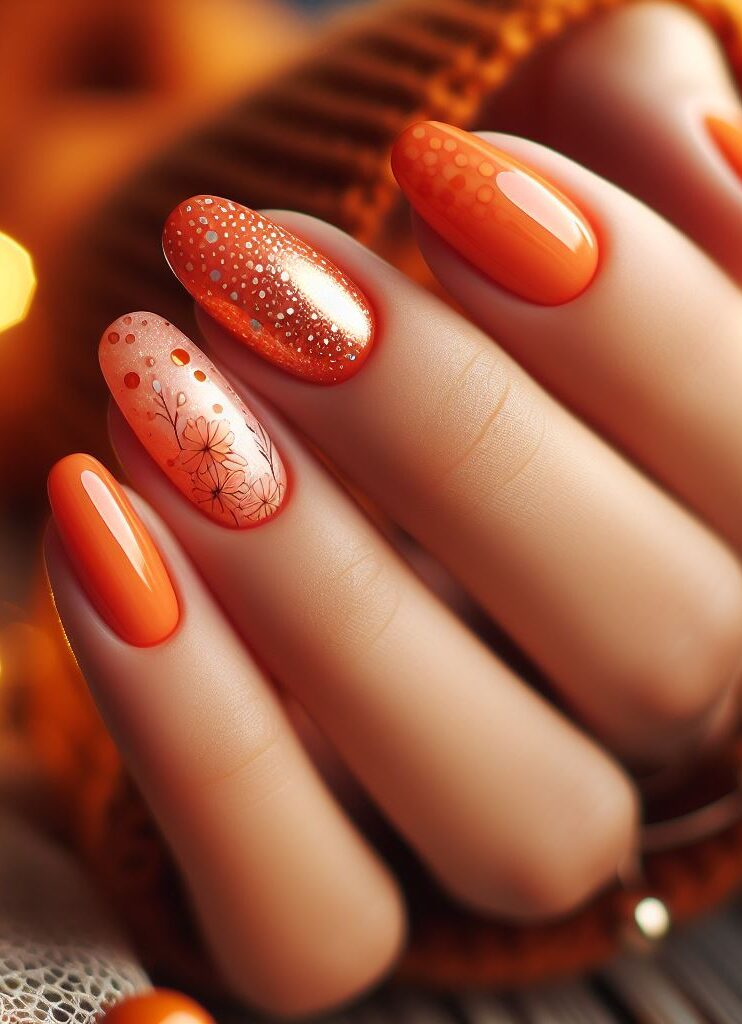 ¡Un toque floral naranja! Realza tu manicura francesa clásica con delicados detalles florales en las puntas para un toque de elegancia natural y un toque floreciente.
¡Un toque floral naranja! Realza tu manicura francesa clásica con delicados detalles florales en las puntas para un toque de elegancia natural y un toque floreciente.
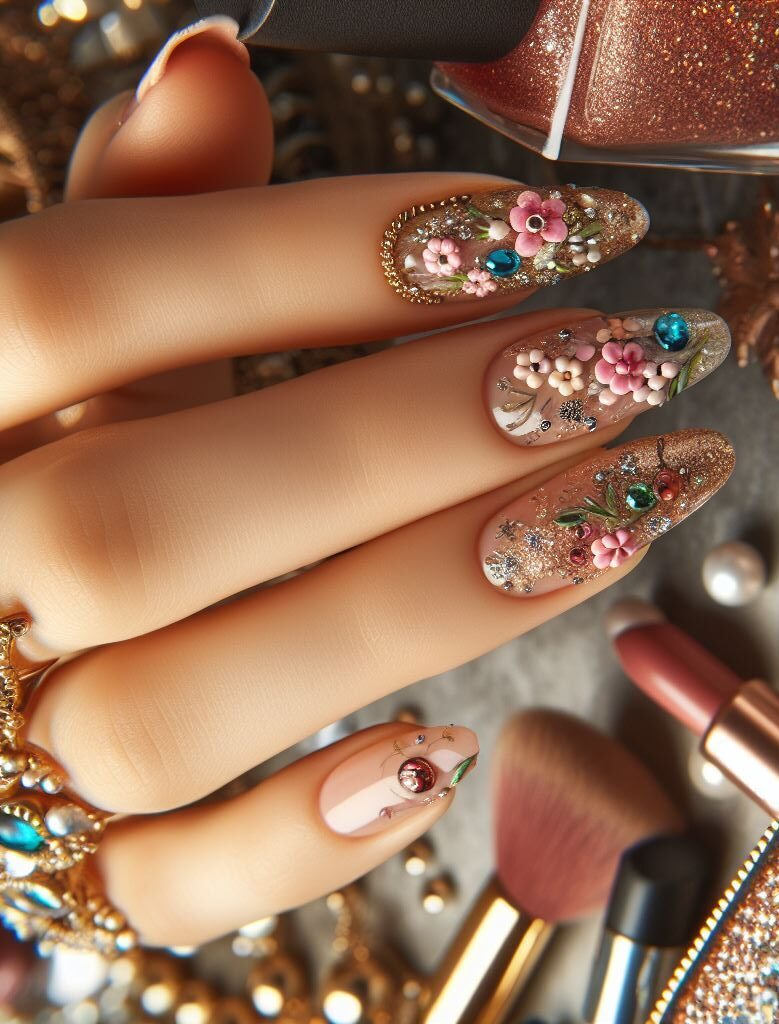 ¡La primavera ya está aquí! Estos hermosos diseños florales de uñas presentan un jardín floreciente de colores y patrones para darle un toque de alegría primaveral.
¡La primavera ya está aquí! Estos hermosos diseños florales de uñas presentan un jardín floreciente de colores y patrones para darle un toque de alegría primaveral.
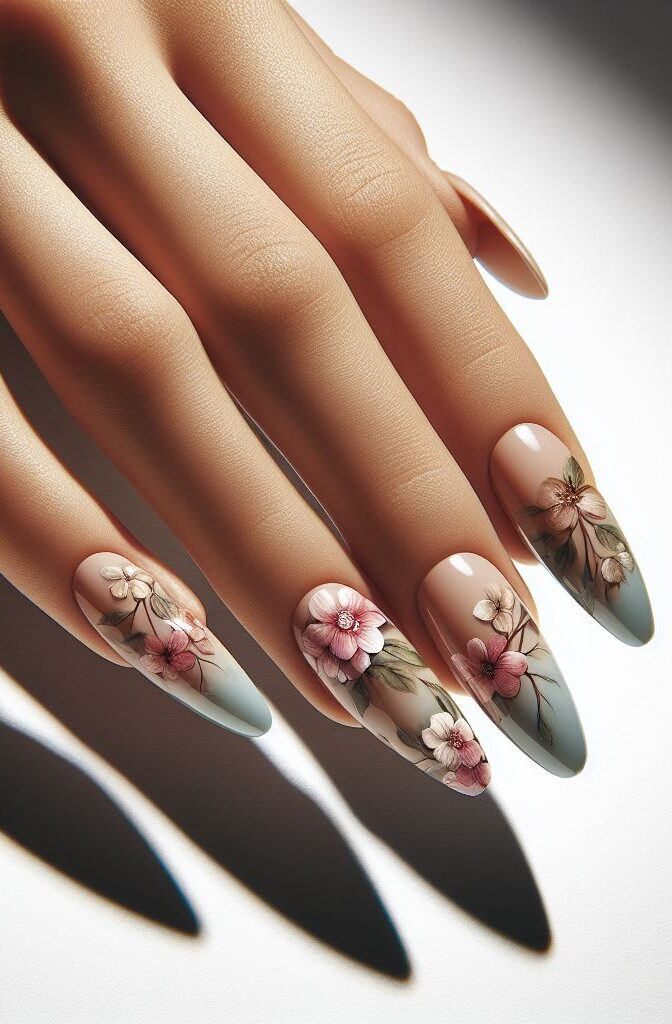 ¡Dale un toque clásico! Rosas, lirios y margaritas: estos florales atemporales cobran vida en impresionantes diseños de uñas, perfectos para un look elegante y sofisticado.
¡Dale un toque clásico! Rosas, lirios y margaritas: estos florales atemporales cobran vida en impresionantes diseños de uñas, perfectos para un look elegante y sofisticado.
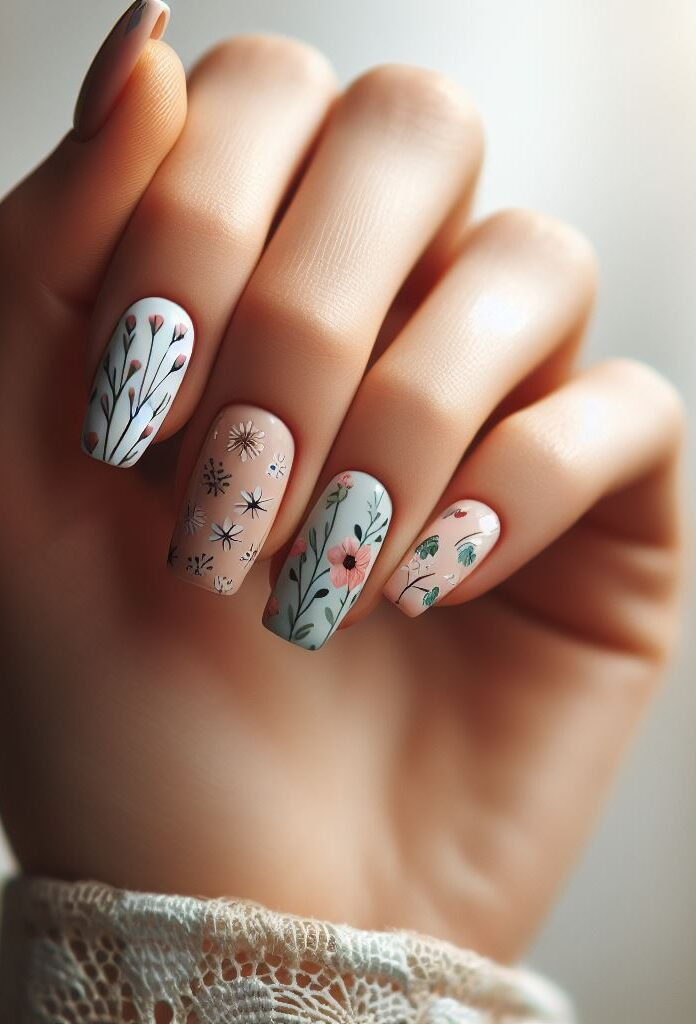 ¡Salvaje y maravilloso! Saca a relucir tu espíritu libre con un diseño de uñas vibrante con flores silvestres y delicados helechos para un toque bohemio.
¡Salvaje y maravilloso! Saca a relucir tu espíritu libre con un diseño de uñas vibrante con flores silvestres y delicados helechos para un toque bohemio.
 ¡Un capricho de acuarela! Crea un look suave y soñador con hermosos diseños de uñas florales en acuarela con suaves toques de color y delicados motivos florales.
¡Un capricho de acuarela! Crea un look suave y soñador con hermosos diseños de uñas florales en acuarela con suaves toques de color y delicados motivos florales.
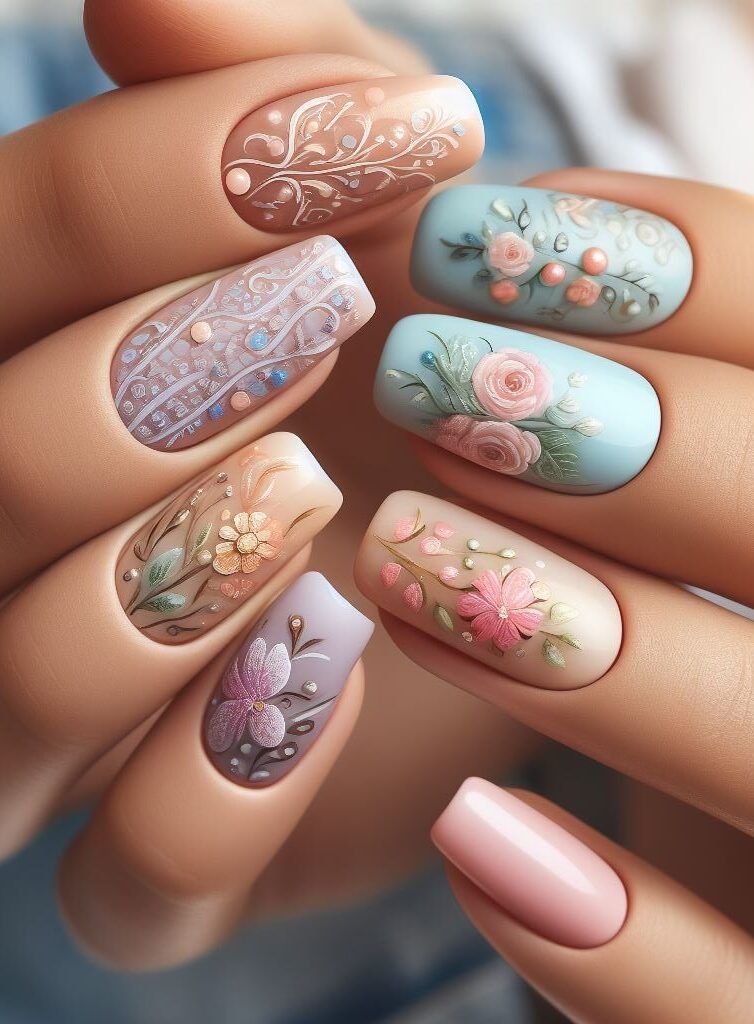 ¡Magia minimalista! Menos es más con estos elegantes diseños de uñas con flores individuales o pequeños detalles florales para un toque de sobria elegancia.
¡Magia minimalista! Menos es más con estos elegantes diseños de uñas con flores individuales o pequeños detalles florales para un toque de sobria elegancia.
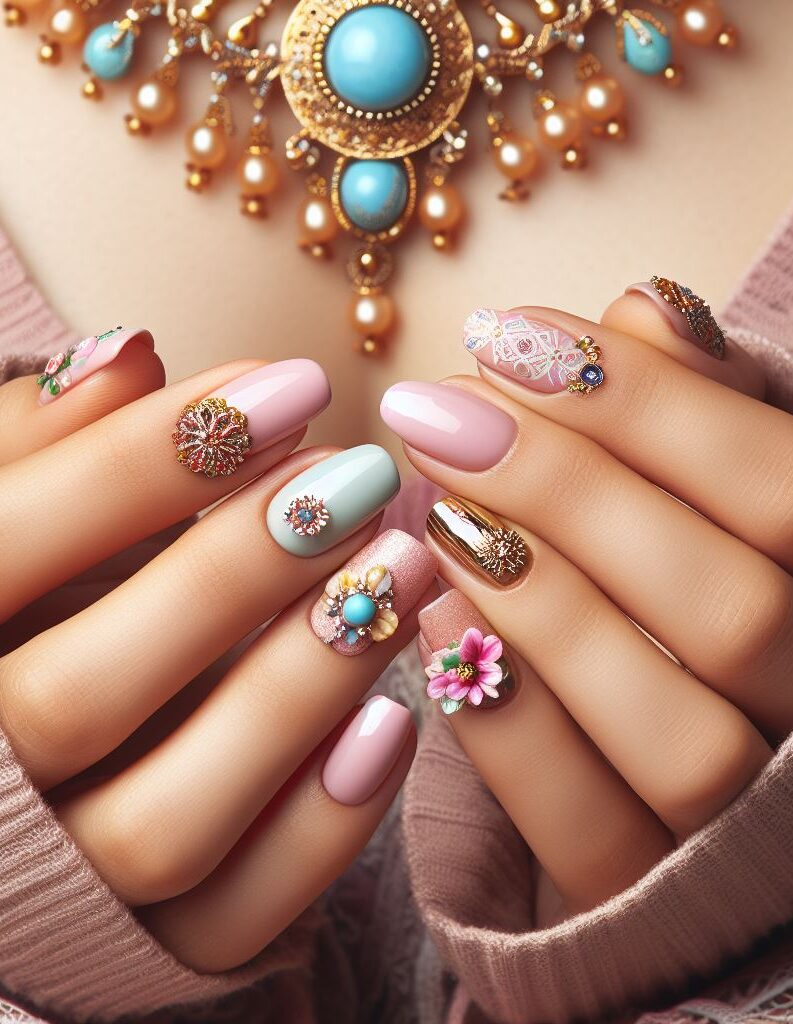 ¡Brillante resplandor! Recrea la belleza de la naturaleza con un impresionante diseño floral en 3D con pétalos realistas y delicados detalles.
¡Brillante resplandor! Recrea la belleza de la naturaleza con un impresionante diseño floral en 3D con pétalos realistas y delicados detalles.
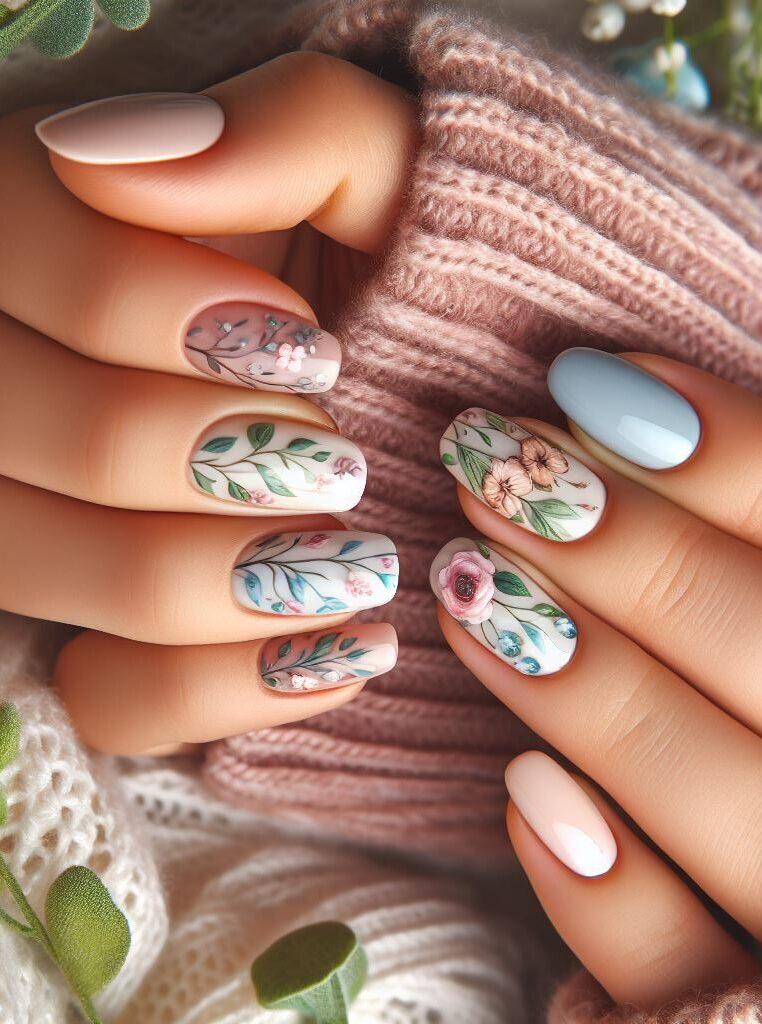 ¡Jardines globales! Explora la belleza de las flores de todo el mundo con diseños de uñas con exóticas orquídeas, vibrantes plumerias o delicadas flores de cerezo.
¡Jardines globales! Explora la belleza de las flores de todo el mundo con diseños de uñas con exóticas orquídeas, vibrantes plumerias o delicadas flores de cerezo.
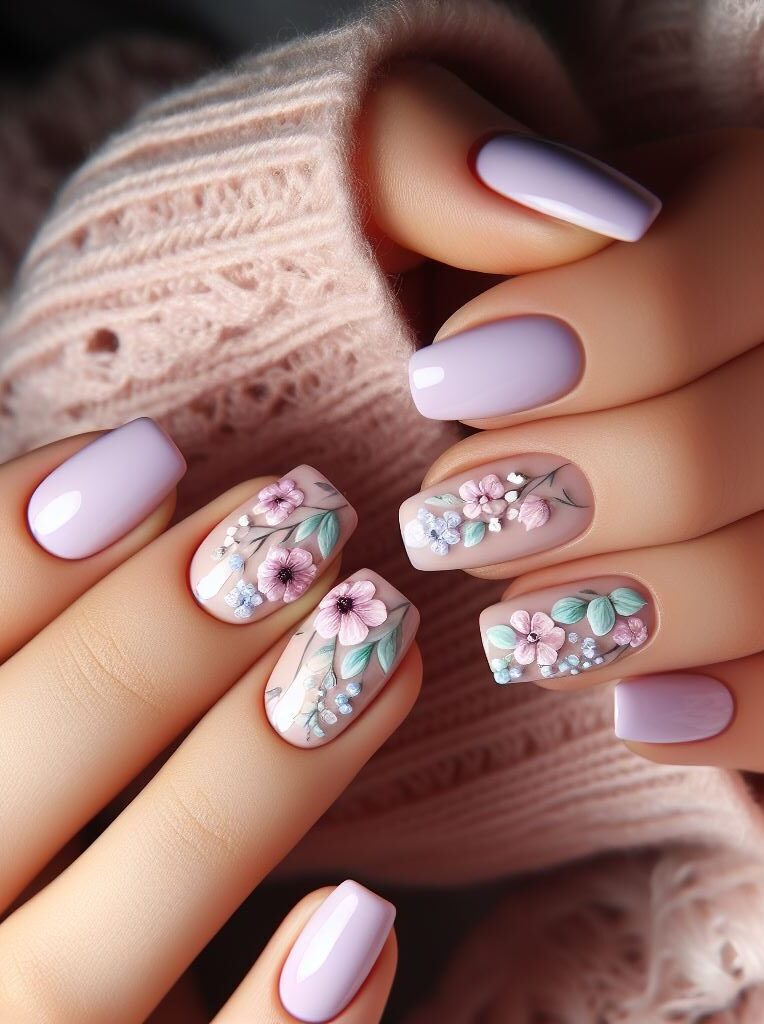 ¡Dulce y pequeña! Saca tu lado kawaii con un adorable diseño de uñas con pequeños capullos de flores, lunares divertidos y paletas de colores pastel para un look dulce y azucarado.
¡Dulce y pequeña! Saca tu lado kawaii con un adorable diseño de uñas con pequeños capullos de flores, lunares divertidos y paletas de colores pastel para un look dulce y azucarado.
Página 3
En el dinámico mundo de la belleza y la autoexpresión, el arte de uñas continúa evolucionando, reflejando las últimas tendencias, técnicas e influencias culturales. Desde diseños minimalistas hasta diseños impactantes, el arte de uñas contemporáneo abarca una amplia gama de estilos que satisfacen los gustos y preferencias individuales de las entusiastas de todo el mundo. En esta exploración, nos adentramos en el apasionante mundo de las tendencias contemporáneas del arte de uñas, descubriendo las últimas innovaciones y estilos que están transformando el panorama actual de las uñas.
En los últimos años, el nail art minimalista se ha convertido en una tendencia destacada, caracterizada por líneas limpias, adornos sutiles y una elegancia discreta. Esta estética celebra la simplicidad y la sofisticación, con diseños que presentan patrones geométricos, espacio negativo y paletas de colores monocromáticas. El nail art minimalista ofrece un toque moderno a los estilos clásicos, permitiendo a las personas destacar con sus uñas, manteniendo un toque de refinamiento y sobriedad.
Para quienes buscan un nail art audaz y expresivo, los diseños abstractos ofrecen una vía creativa para la autoexpresión y la experimentación. Inspirados en movimientos artísticos modernos como el expresionismo abstracto y el surrealismo, estos diseños presentan colores vibrantes, formas orgánicas y motivos extravagantes que desafían las convenciones tradicionales. El nail art abstracto anima a las personas a dar rienda suelta a su creatividad y a aceptar lo inesperado, dando como resultado manicuras verdaderamente únicas y llamativas que sin duda llamarán la atención.
Como un guiño al pasado, el nail art de inspiración vintage ha vuelto con fuerza en los últimos años, inspirándose en la estética retro y épocas pasadas. Desde el glamour de las pin-ups de los años 50 hasta la nostalgia neón de los 80, estos diseños rinden homenaje a los estilos icónicos de antaño con un toque contemporáneo. El nail art vintage combina colores alegres, patrones retro y motivos kitsch, permitiendo a las personas recrear sus décadas de moda favoritas y mostrar su amor por todo lo vintage.
Artistas de uñas innovadores están revolucionando la creatividad con el arte de uñas con técnicas mixtas, incorporando materiales y técnicas poco convencionales para crear diseños verdaderamente únicos. Desde adornos 3D hasta acabados texturizados, estas manicuras vanguardistas difuminan la línea entre el arte de uñas y la escultura, transformando las uñas en pequeñas obras de arte. El arte de uñas con técnicas mixtas fomenta la experimentación y la innovación, invitando a las personas a explorar nuevas técnicas y materiales en busca de la manicura perfecta.
En respuesta a la creciente preocupación por el medio ambiente, las uñas ecológicas se han convertido en tendencia, con un enfoque en materiales y prácticas sostenibles. Desde esmaltes no tóxicos hasta purpurina biodegradable, estas manicuras ecológicas priorizan alternativas respetuosas con el planeta sin comprometer el estilo ni el rendimiento. El nail art sostenible celebra la belleza de la naturaleza a la vez que promueve la responsabilidad ambiental, ofreciendo a las personas una forma de disfrutar de su pasión por el nail art sin remordimientos.
Mientras exploramos el cambiante panorama de las tendencias contemporáneas de nail art, algo queda claro: es una poderosa forma de autoexpresión que no conoce límites. Ya sea que prefieras un estilo minimalista chic o atrevido, expresiones abstractas o un toque vintage, hay una tendencia de nail art para que todos la exploren y disfruten. Al acoger la diversidad y la creatividad, podemos celebrar la belleza de la individualidad y expresarnos a través de nuestras uñas de maneras verdaderamente únicas e inspiradoras.
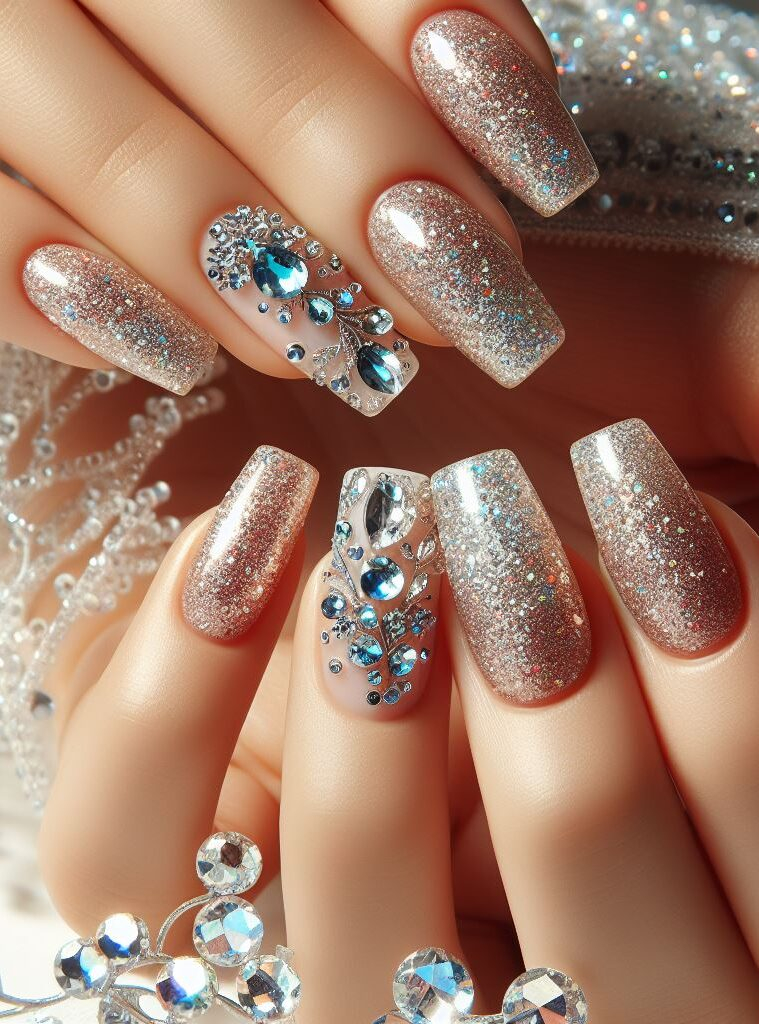 ¡Brilla y resplandece! ✨ El arte de uñas con purpurina y pedrería es la manera perfecta de añadir glamour y dramatismo a tus uñas. Desde detalles sutiles hasta un brillo intenso, ¡las posibilidades son infinitas!
¡Brilla y resplandece! ✨ El arte de uñas con purpurina y pedrería es la manera perfecta de añadir glamour y dramatismo a tus uñas. Desde detalles sutiles hasta un brillo intenso, ¡las posibilidades son infinitas!
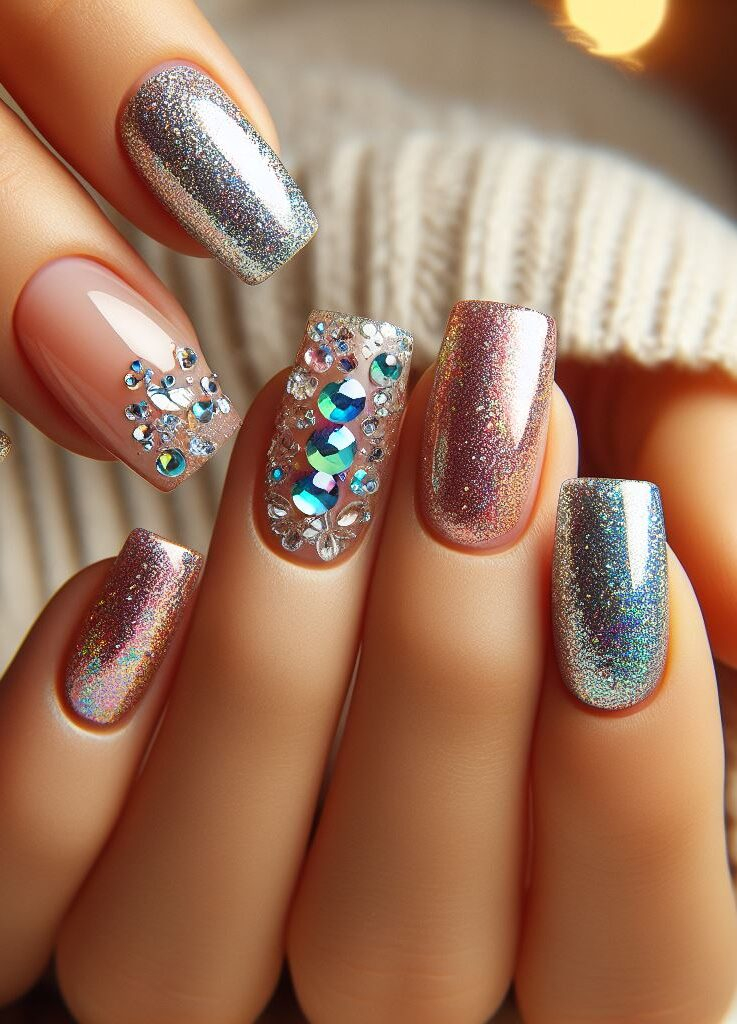 ¡Olvídate de la manicura aburrida! Dale un toque especial a tu manicura con una combinación deslumbrante de purpurina y pedrería.
¡Olvídate de la manicura aburrida! Dale un toque especial a tu manicura con una combinación deslumbrante de purpurina y pedrería.
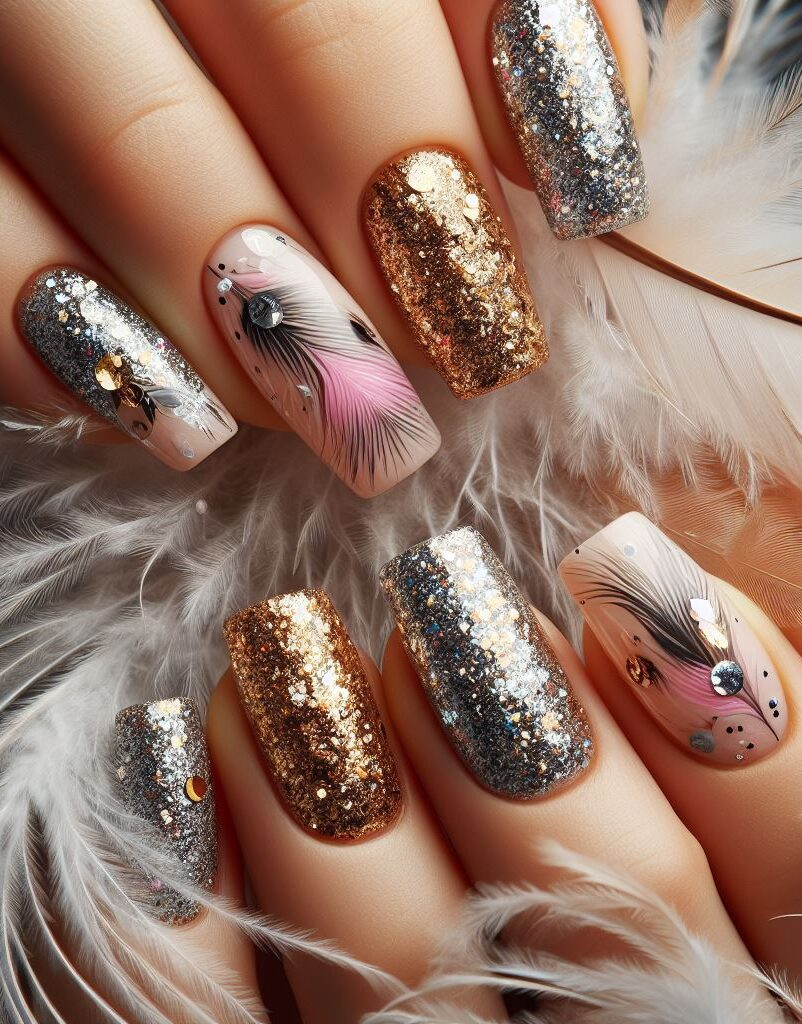 ¡Manicura francesa con un toque diferente! Dale un toque de brillo a tu manicura francesa clásica con puntas de purpurina o delicados detalles de pedrería.
¡Manicura francesa con un toque diferente! Dale un toque de brillo a tu manicura francesa clásica con puntas de purpurina o delicados detalles de pedrería.
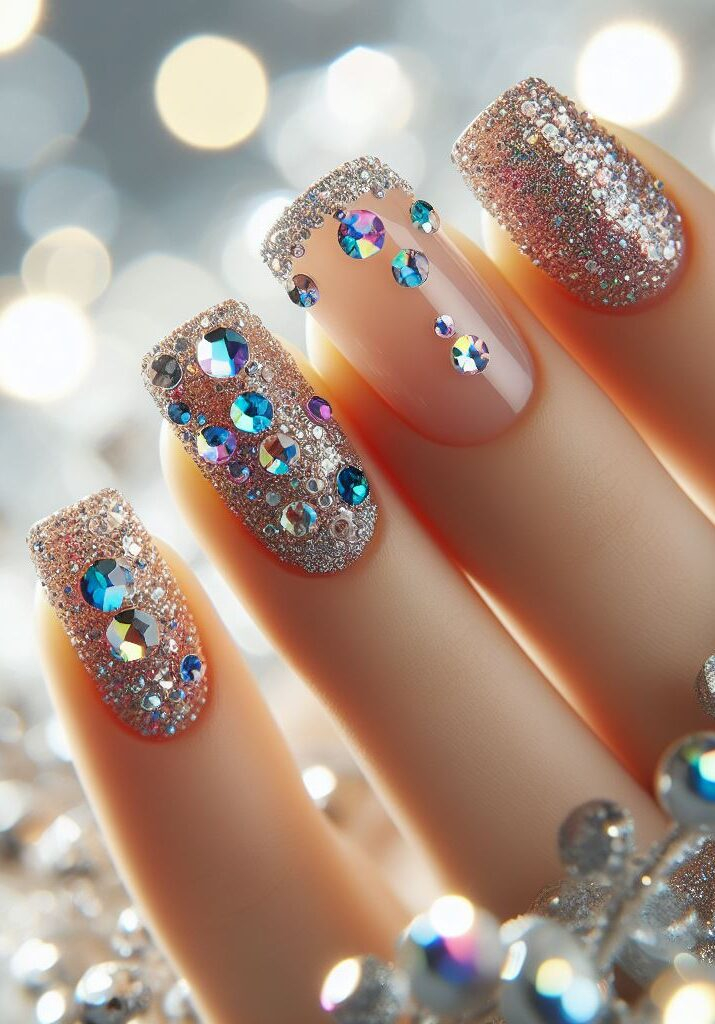 ¡Magia minimalista! Opta por un look simple y elegante con un toque de brillo en la capa base y un diamante de imitación bien colocado para un look moderno.
¡Magia minimalista! Opta por un look simple y elegante con un toque de brillo en la capa base y un diamante de imitación bien colocado para un look moderno.
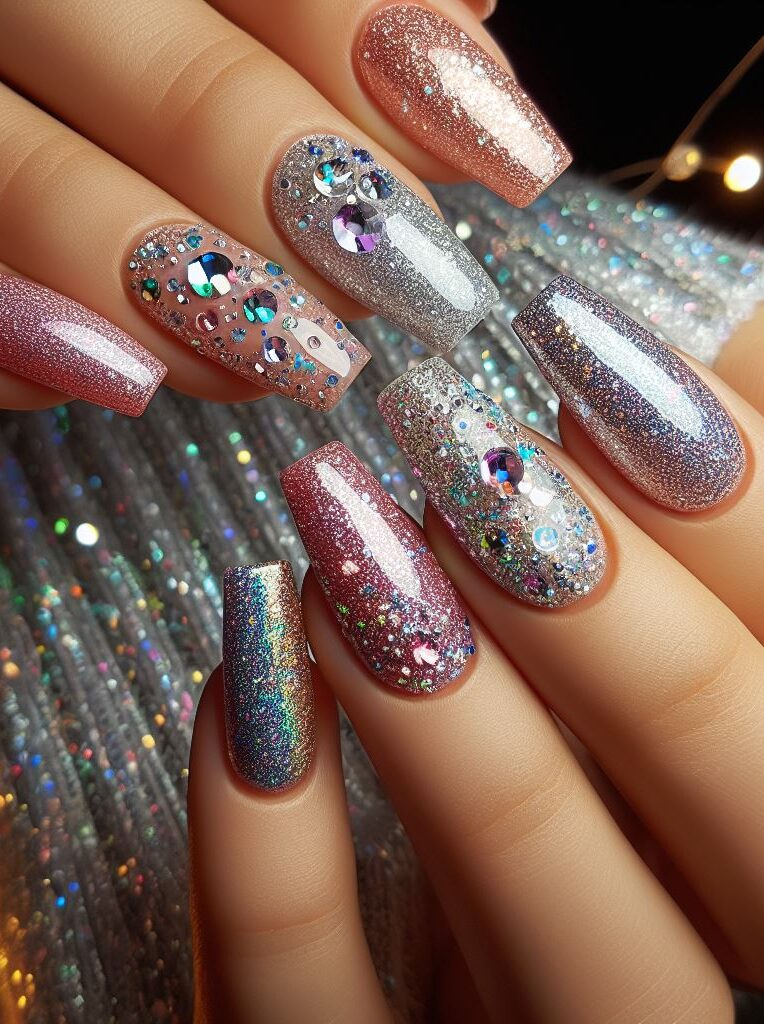 ¡Glamour ombré! Crea un efecto fascinante con purpurina que pasa de un sutil brillo a un brillo intenso, acentuado con delicados cristales de imitación.
¡Glamour ombré! Crea un efecto fascinante con purpurina que pasa de un sutil brillo a un brillo intenso, acentuado con delicados cristales de imitación.
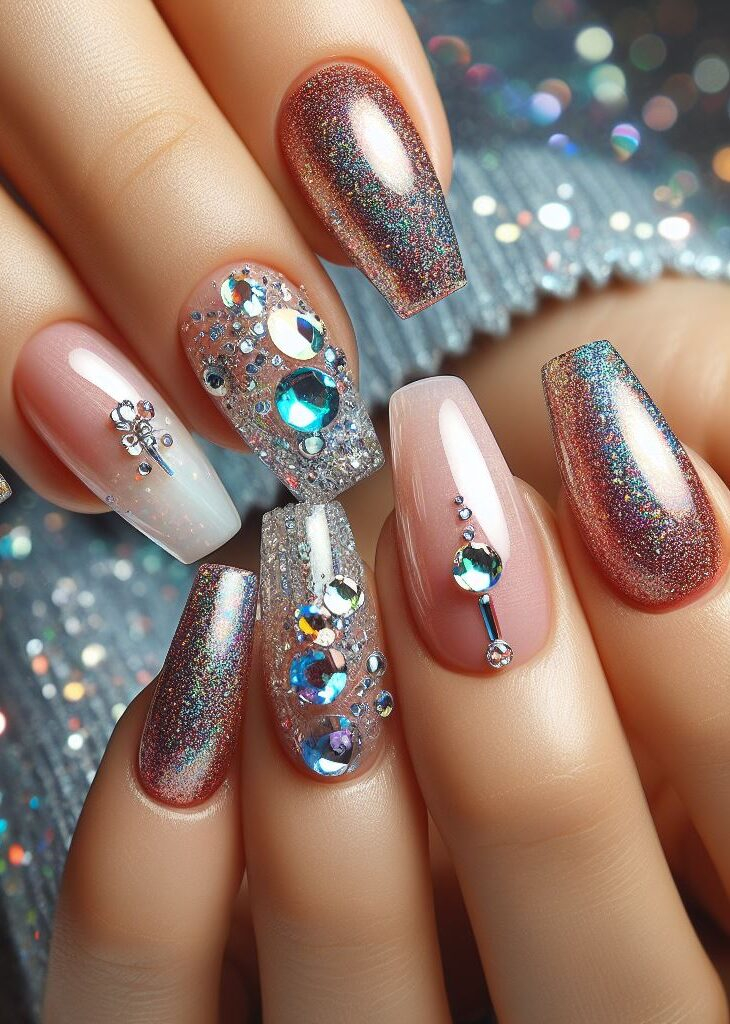 ¡Lista para una cita! Dale un toque de glamour y sofisticación a tu look de noche con un cautivador diseño de uñas con brillo y pedrería.
¡Lista para una cita! Dale un toque de glamour y sofisticación a tu look de noche con un cautivador diseño de uñas con brillo y pedrería.
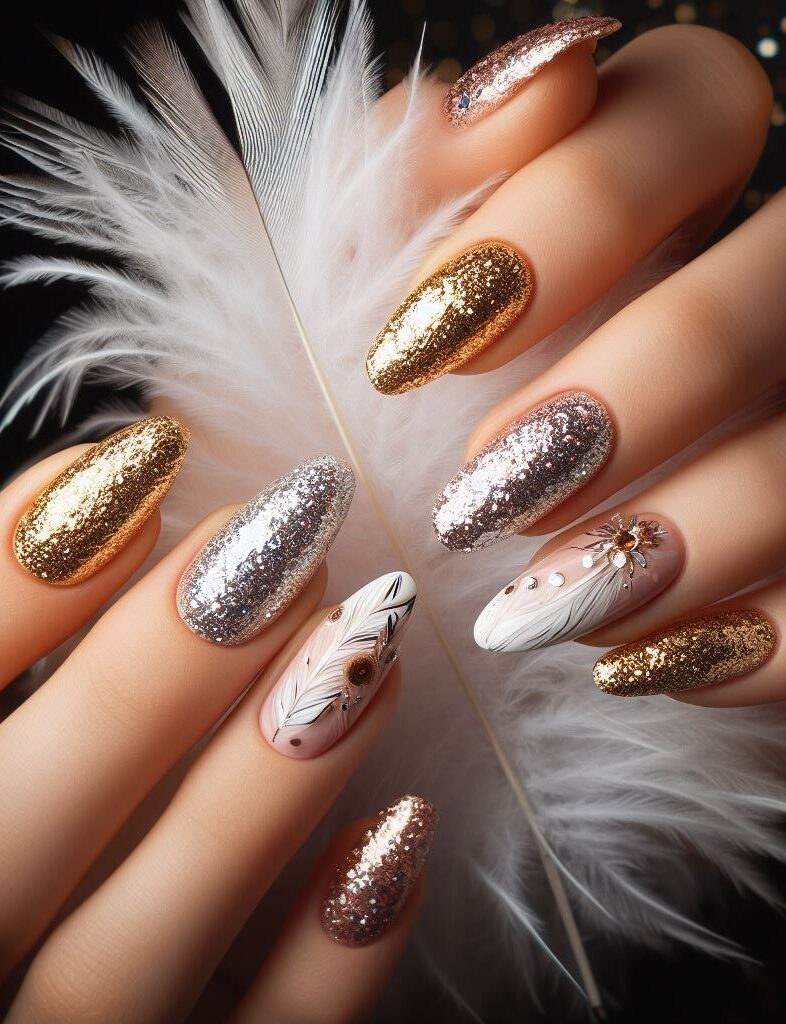 ¡No tengas miedo de ser atrevida! ✨ Combina colores brillantes llamativos y diamantes de imitación llamativos para lograr un look espectacular que llamará la atención.
¡No tengas miedo de ser atrevida! ✨ Combina colores brillantes llamativos y diamantes de imitación llamativos para lograr un look espectacular que llamará la atención.
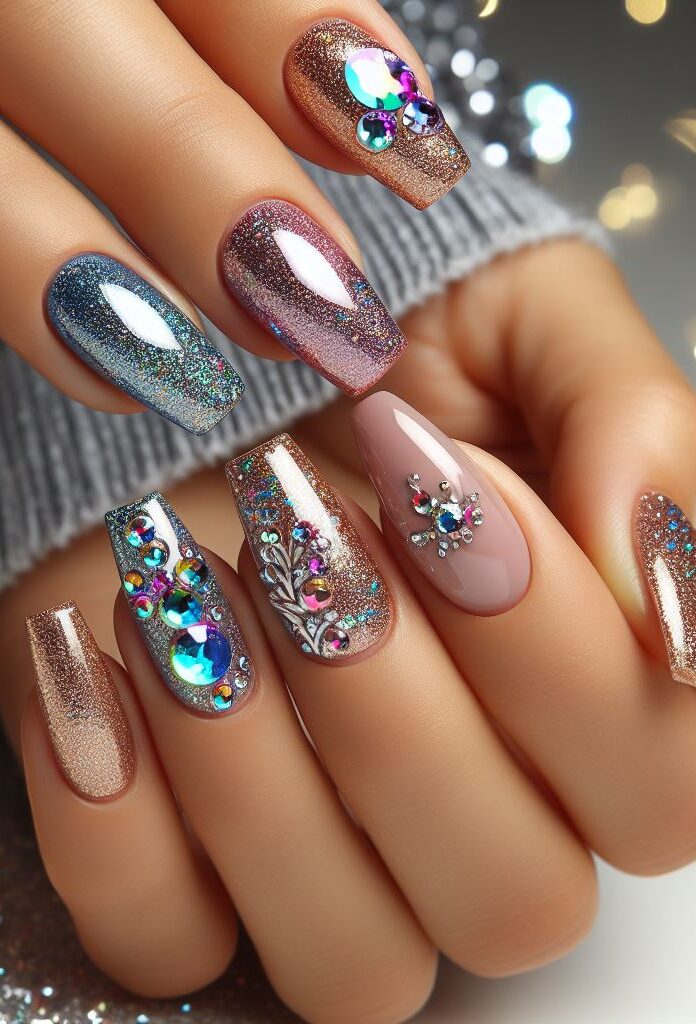 ¡Magia celestial! ✨ Recrea la belleza del cielo nocturno con una combinación de brillo negro brillante y pequeñas estrellas de diamantes de imitación para una apariencia deslumbrante y misteriosa.
¡Magia celestial! ✨ Recrea la belleza del cielo nocturno con una combinación de brillo negro brillante y pequeñas estrellas de diamantes de imitación para una apariencia deslumbrante y misteriosa.
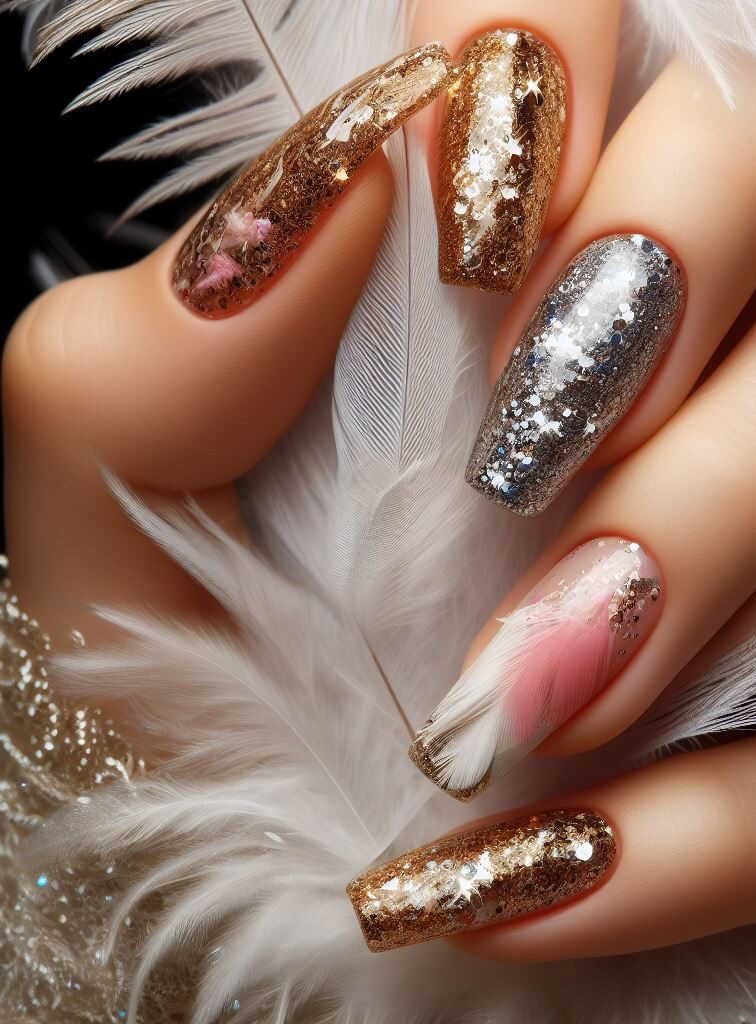 ¡Magia de la Vía Láctea! ✨ Crea un look etéreo y de ensueño con una capa base de color blanco lechoso acentuada por un delicado brillo holográfico y diamantes de imitación dispersos como pequeñas constelaciones.
¡Magia de la Vía Láctea! ✨ Crea un look etéreo y de ensueño con una capa base de color blanco lechoso acentuada por un delicado brillo holográfico y diamantes de imitación dispersos como pequeñas constelaciones.
Al observar la bola de cristal de las tendencias de belleza, algo queda clarísimo: el futuro del arte de las uñas rebosa de innovación, creatividad e infinitas posibilidades. Con los avances tecnológicos, los cambios culturales y las preferencias cambiantes de los consumidores, está a punto de entrar en una nueva era de experimentación y evolución. En esta exploración, nos asomamos al horizonte del futuro del arte de las uñas, descubriendo las tendencias, tecnologías e innovaciones que definirán el panorama del arte de las uñas en los próximos años.
Uno de los avances más prometedores en el arte de las uñas es la integración de la tecnología en los procesos de diseño. Desde aplicaciones de realidad aumentada para probar uñas hasta la tecnología de impresión 3D que permite crear diseños personalizados, los diseños con tecnología están revolucionando la forma en que abordamos el arte de las uñas. Estas innovaciones ofrecen oportunidades inigualables de personalización y creatividad, permitiendo a cada persona crear diseños a medida que reflejen su estilo y personalidad únicos.
En respuesta a la creciente preocupación por el medio ambiente, el futuro del nail art se centra cada vez más en la sostenibilidad y las prácticas ecológicas. Desde fórmulas de esmaltes biodegradables hasta accesorios reutilizables para nail art fabricados con materiales reciclados, las soluciones sostenibles son cada vez más comunes en el mundo del nail art. A medida que los consumidores se conciencian más con el medio ambiente, crece la demanda de productos y servicios de nail art que prioricen tanto la belleza como la sostenibilidad.
El futuro del arte de uñas también está marcado por el compromiso con la representación inclusiva y la celebración de la diversidad. A medida que la industria de la belleza continúa adoptando diversas representaciones de la belleza, también lo hace con diseños que celebran el patrimonio cultural, la identidad individual y la expresión personal. Desde diseños con temática del Orgullo hasta diseños inspirados en tradiciones y celebraciones culturales, el futuro del arte de uñas es uno que acoge y enaltece todas las voces e identidades.
La inteligencia artificial (IA) está a punto de revolucionar la forma en que abordamos el diseño de uñas, ofreciendo soluciones innovadoras para crear diseños personalizados y a la vanguardia. Las plataformas de nail art con IA pueden analizar las preferencias, tendencias e inspiraciones de estilo de las usuarias para generar recomendaciones personalizadas y adaptadas a sus gustos. Esta tecnología permite a las amantes de las uñas explorar nuevos estilos, experimentar con diferentes diseños y dar rienda suelta a su creatividad como nunca antes.
En el futuro, el nail art seguirá siendo una herramienta poderosa para fomentar la comunidad y la conexión en un mundo cada vez más digital. Las redes sociales y las comunidades en línea desempeñarán un papel vital para conectar a los amantes de las uñas de todo el mundo, ofreciendo un espacio para compartir inspiración, intercambiar consejos y técnicas, y celebrar las creaciones de los demás. El futuro del nail art se define por la colaboración, la creatividad y el sentido de pertenencia dentro de una comunidad global de amantes de la belleza.
Al mirar hacia el futuro del nail art, una cosa es segura: las posibilidades son infinitas. Con innovaciones tecnológicas, un enfoque en la sostenibilidad y un compromiso con la inclusión y la comunidad, está a punto de entrar en una nueva era dorada de creatividad y expresión. Tanto si eres un apasionado del nail art como si apenas estás incursionando en el mundo de la manicura, el futuro promete una vibrante gama de colores, estilos y diseños esperando ser explorados. Así que deja volar tu imaginación y prepárate para pintar la ciudad, y tus uñas, con la belleza y la creatividad del nail art.
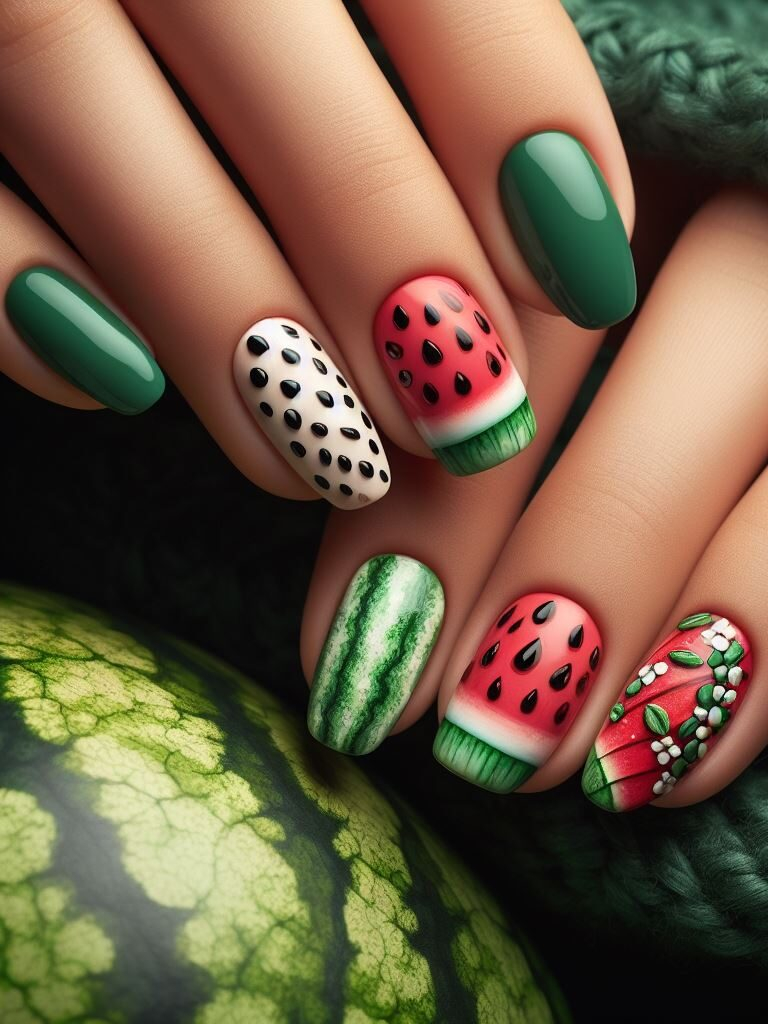 ¡El verano a tu alcance! El nail art con sandía, con vibrantes tonos rosa y verde, es la manera perfecta de recibir el buen tiempo.
¡El verano a tu alcance! El nail art con sandía, con vibrantes tonos rosa y verde, es la manera perfecta de recibir el buen tiempo.
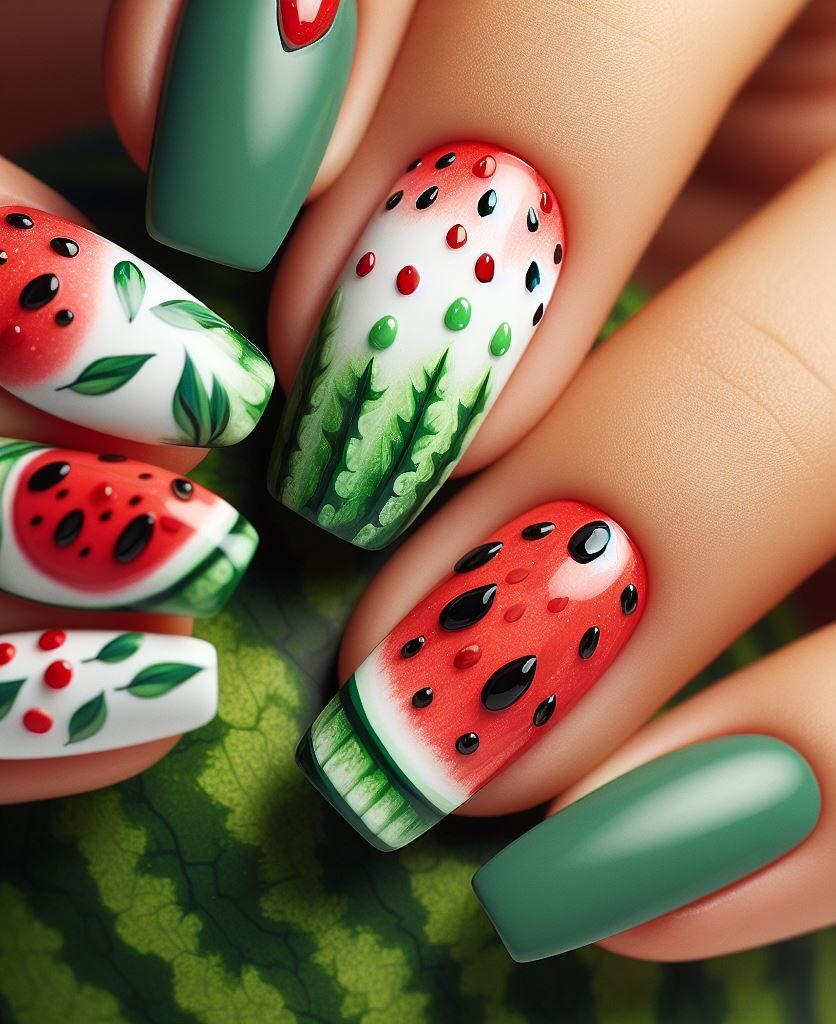 ¿Te animas a jugar? Experimenta con rodajas de sandía, semillas y un toque de brillo para un look divertido y afrutado.
¿Te animas a jugar? Experimenta con rodajas de sandía, semillas y un toque de brillo para un look divertido y afrutado.
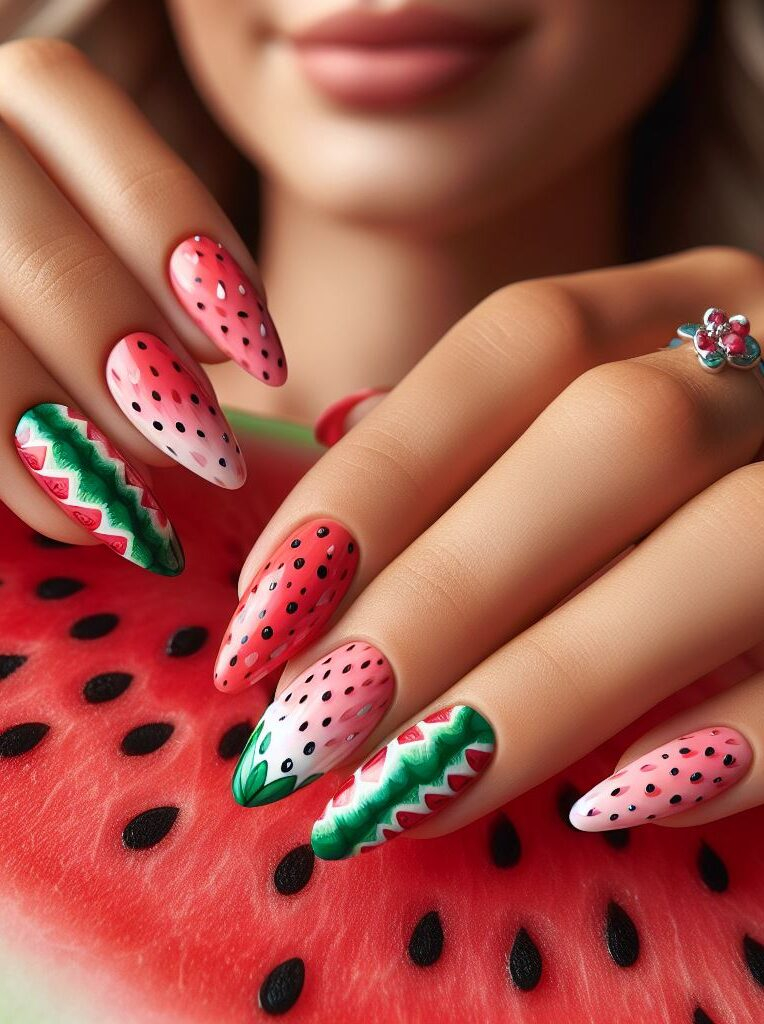 ¡Magia minimalista! Recrea la esencia de la sandía con una sola rebanada llamativa sobre una base neutra para un look moderno y refrescante.
¡Magia minimalista! Recrea la esencia de la sandía con una sola rebanada llamativa sobre una base neutra para un look moderno y refrescante.
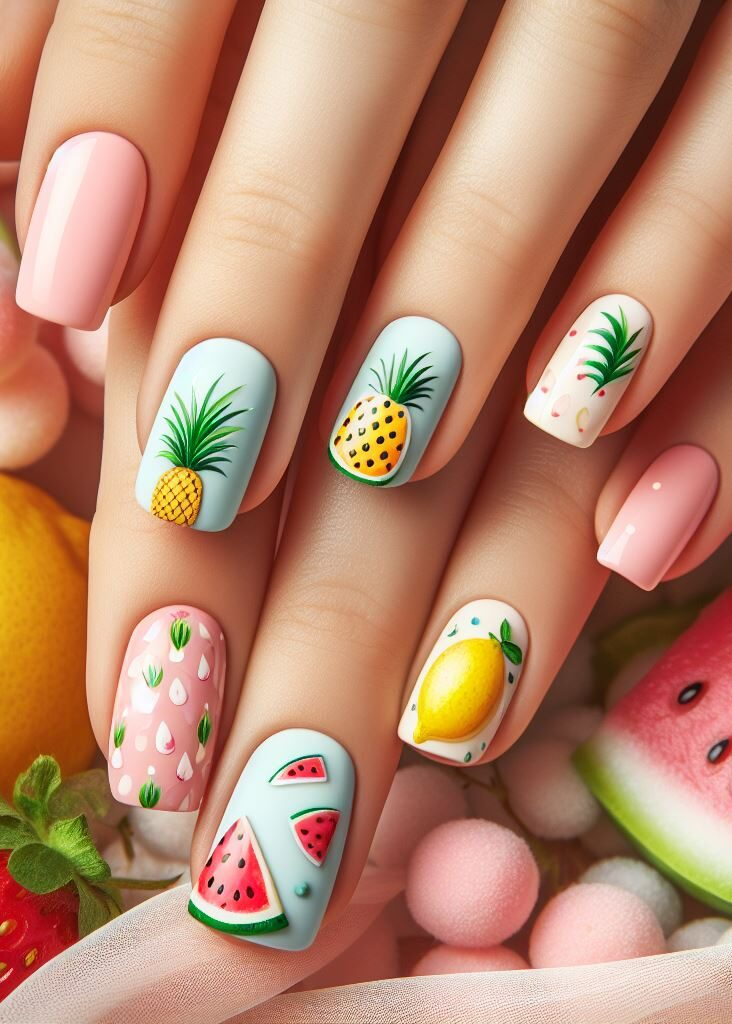 ¡Un paraíso tropical al alcance de tu mano! Combina jugosas rodajas de sandía con detalles de piña para un vibrante diseño de uñas con un toque frutal. ¡Perfecto para una escapada de verano!
¡Un paraíso tropical al alcance de tu mano! Combina jugosas rodajas de sandía con detalles de piña para un vibrante diseño de uñas con un toque frutal. ¡Perfecto para una escapada de verano!
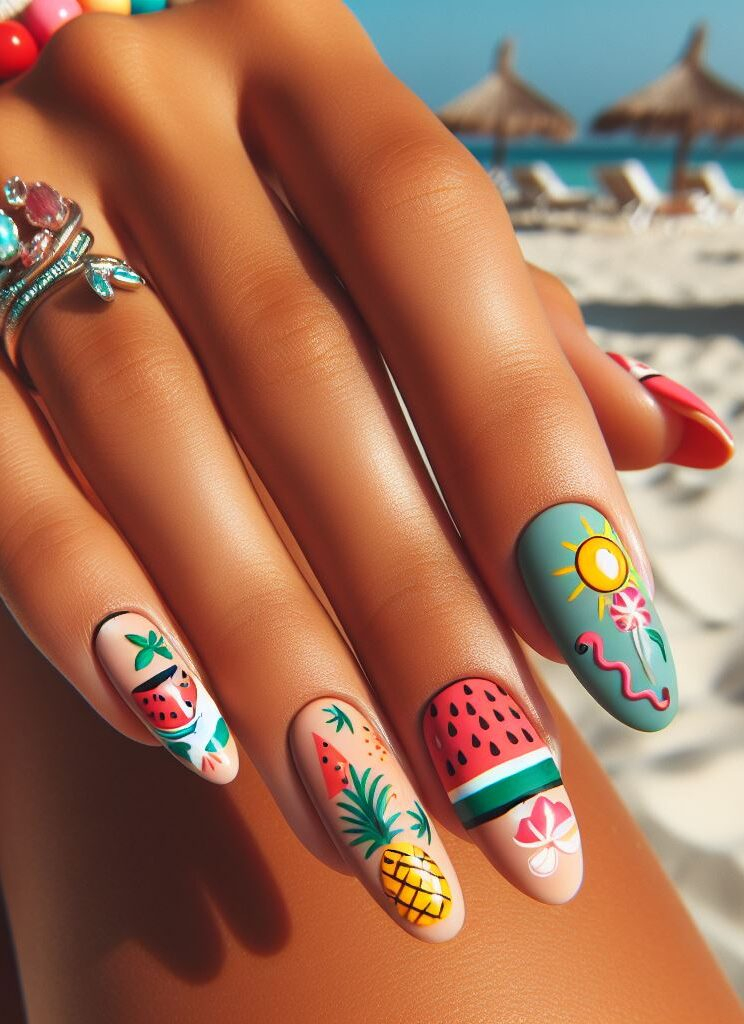 ¡Diversión frutal para todos! Este divertido diseño de uñas combina rodajas de sandía, piñas pequeñas y toques de verde para un look alegre y veraniego.
¡Diversión frutal para todos! Este divertido diseño de uñas combina rodajas de sandía, piñas pequeñas y toques de verde para un look alegre y veraniego.
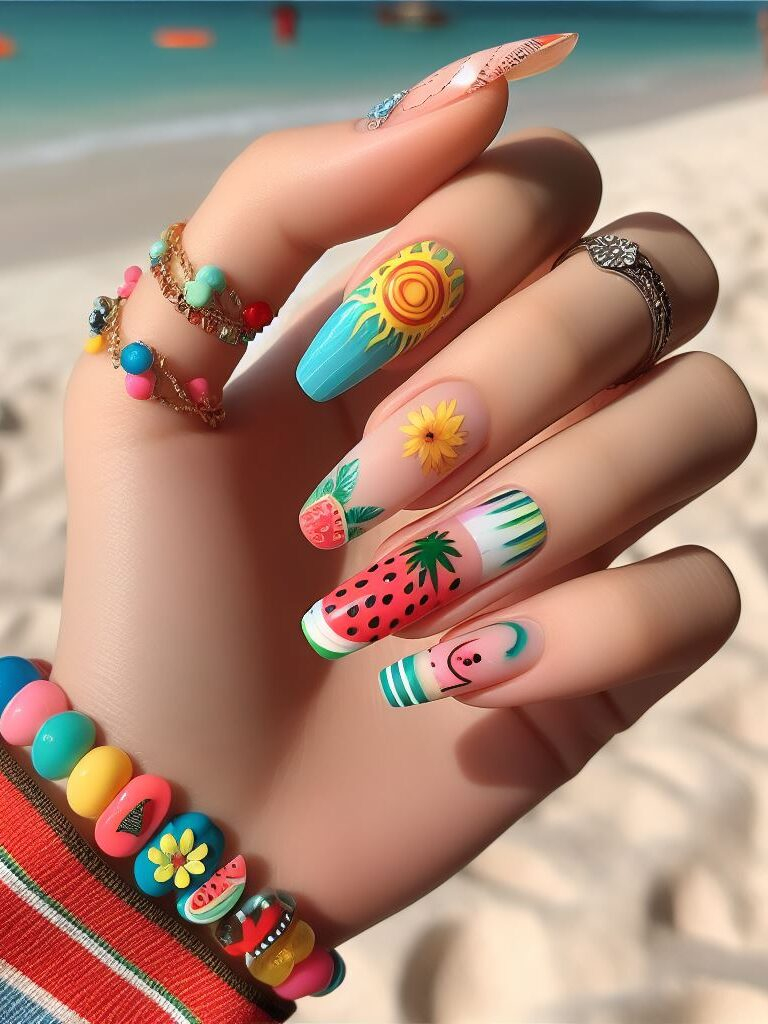 ¡Minimalismo mágico! Recrea la esencia de la sandía con una rodaja llamativa y unos puntos negros de semillas para una versión moderna y elegante del arte de uñas frutal.
¡Minimalismo mágico! Recrea la esencia de la sandía con una rodaja llamativa y unos puntos negros de semillas para una versión moderna y elegante del arte de uñas frutal.
